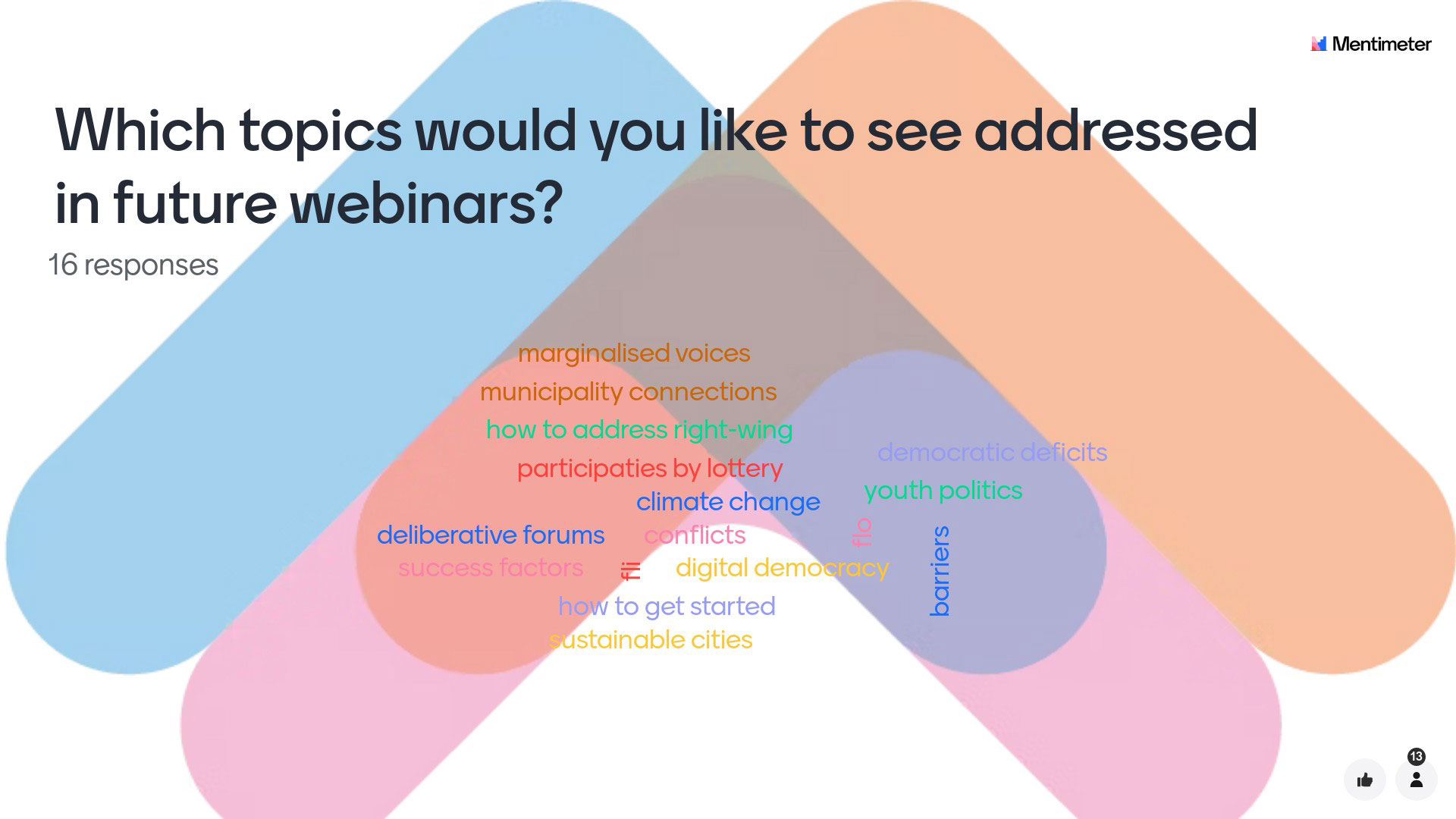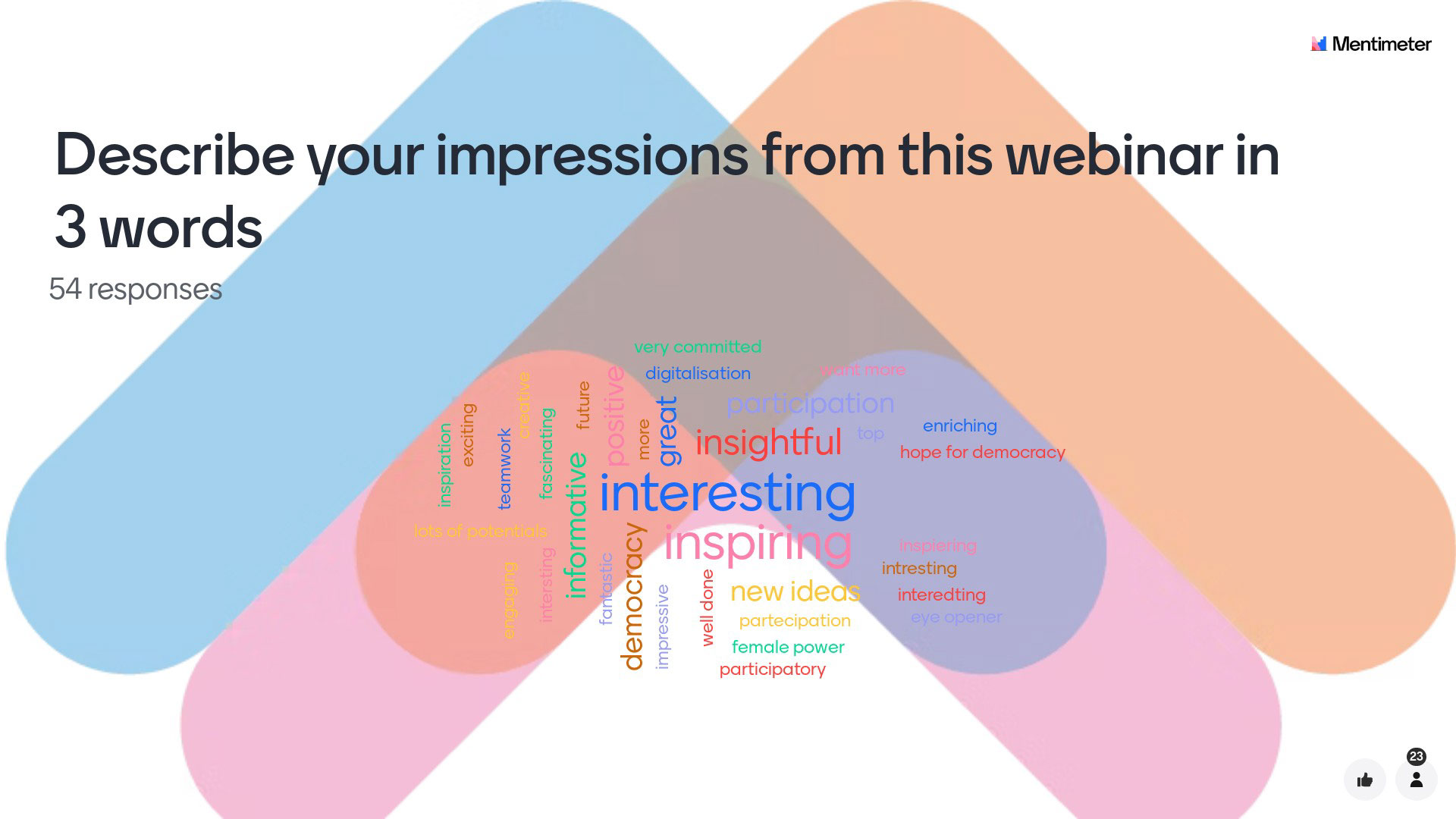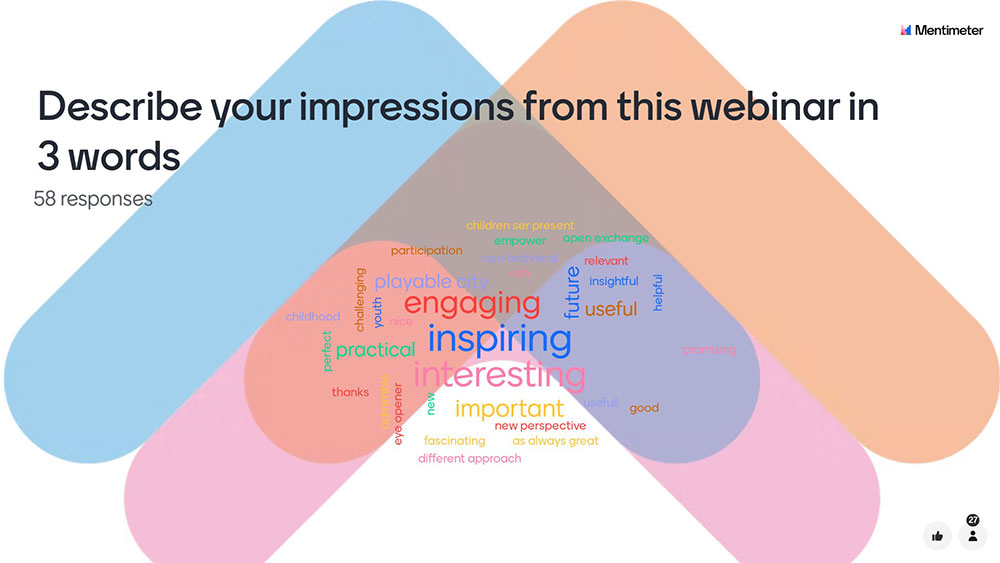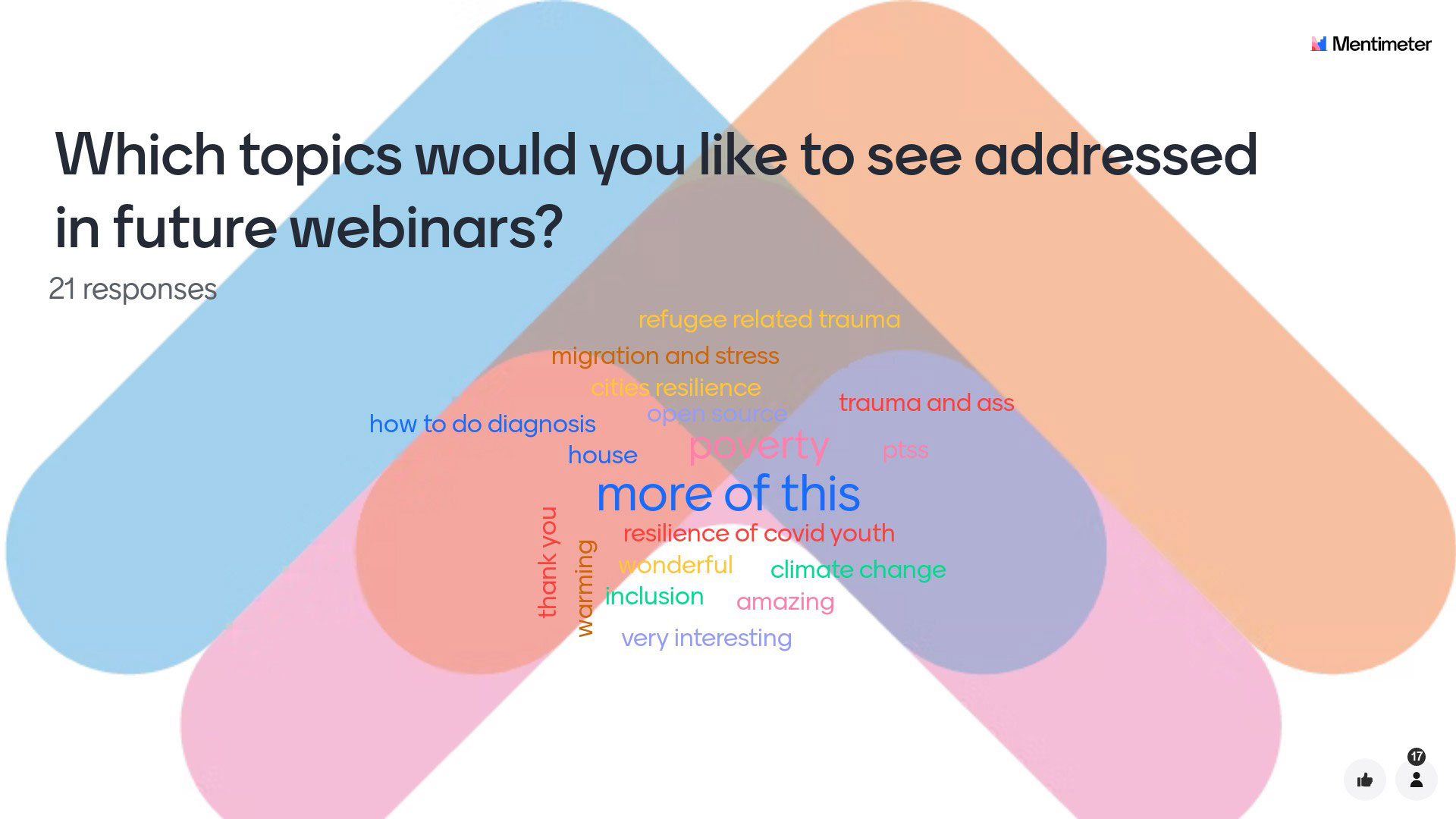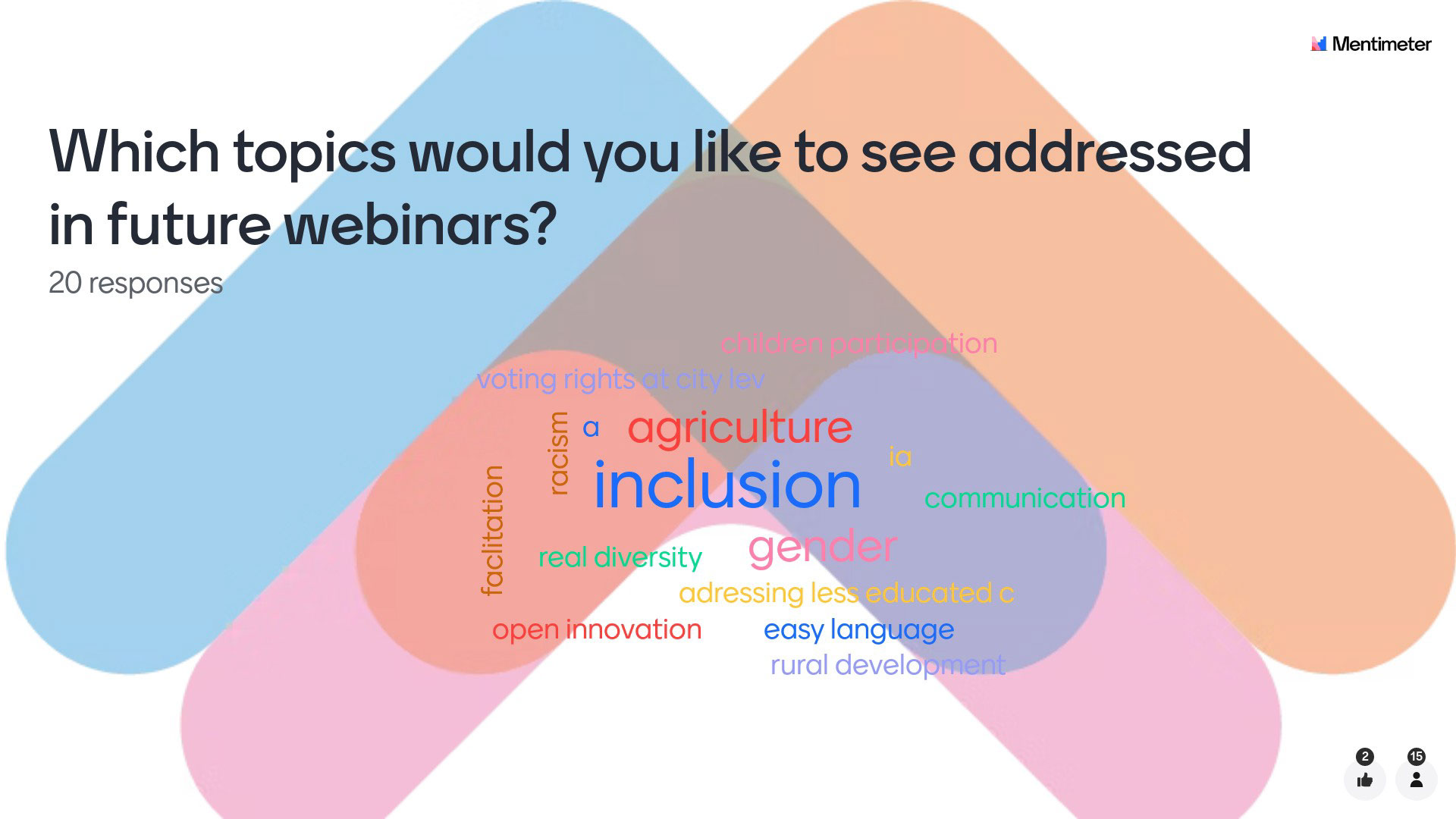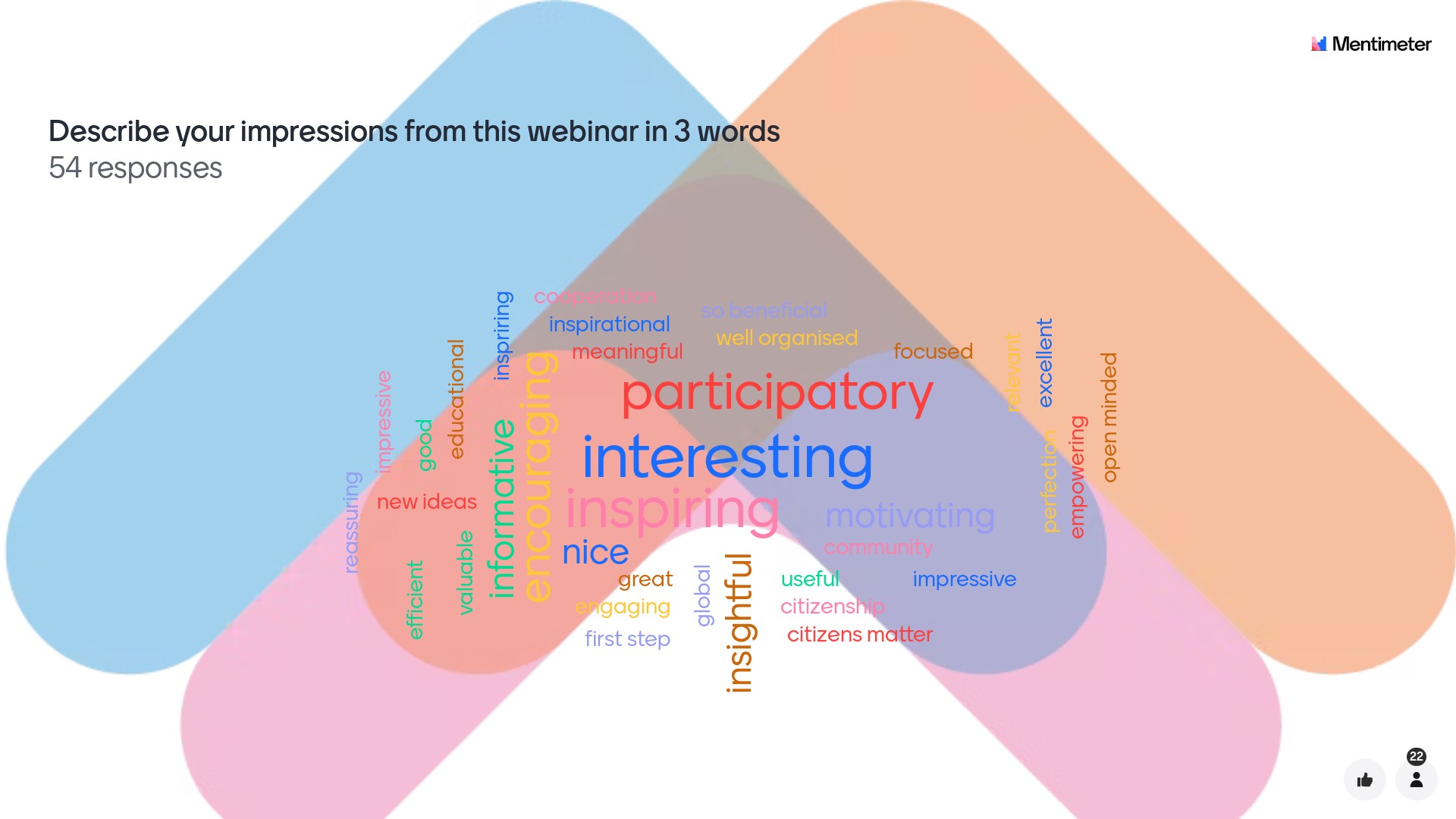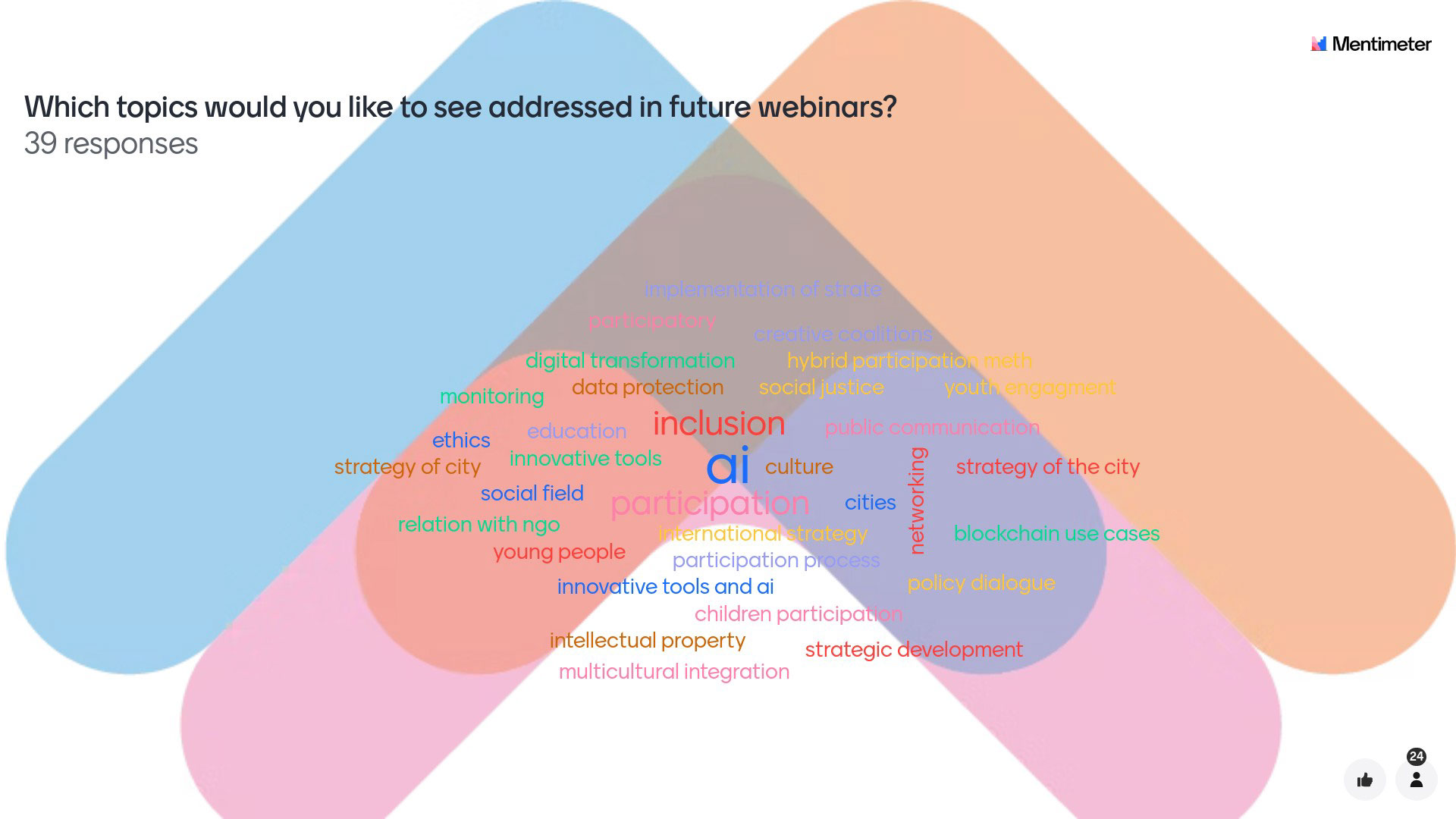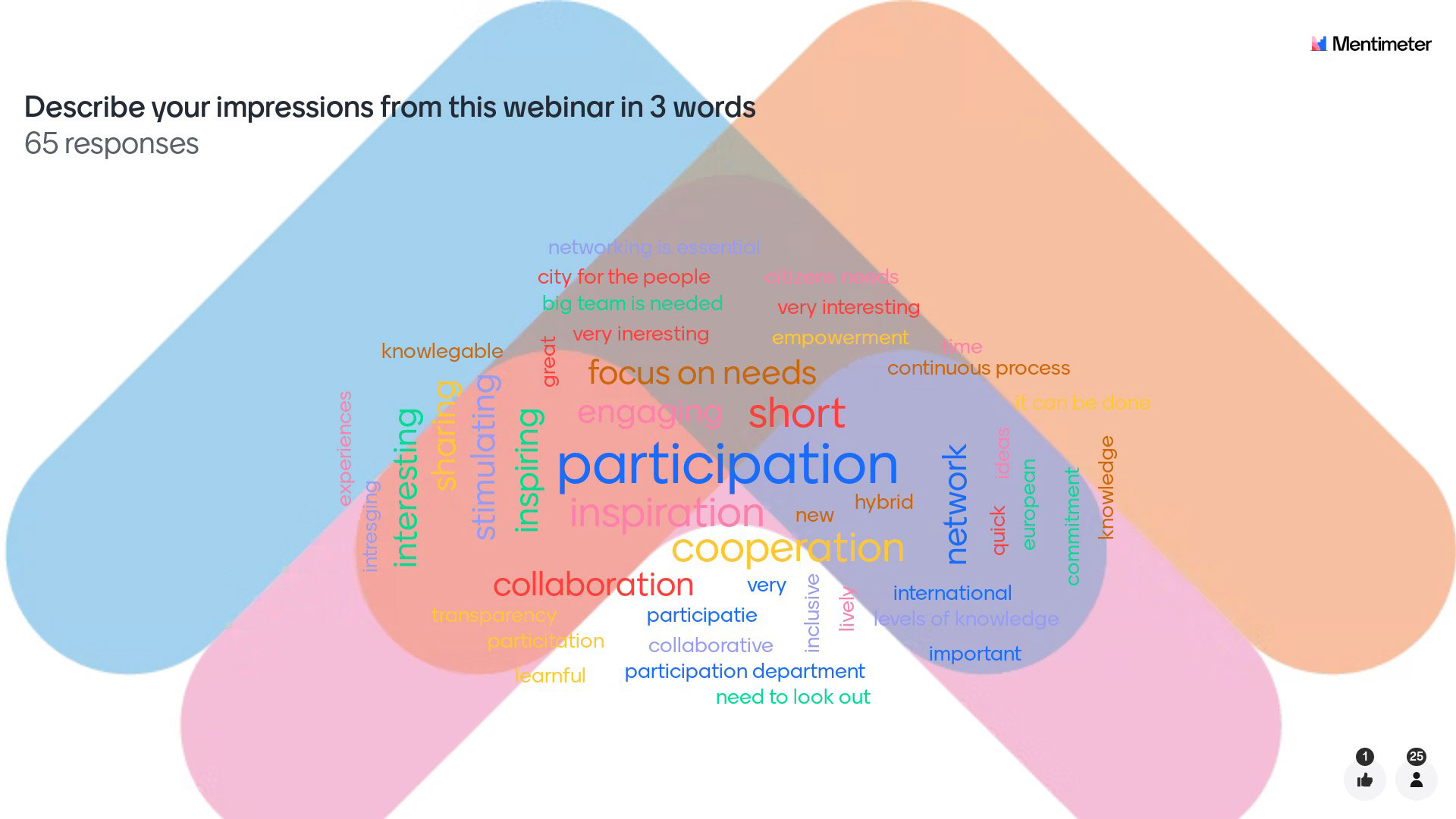European City Network – Webinars and Meetings

With the CERV-funded “European City Network” project, we are able to further develop the network and expand its activities, making it fit for growth. Sharing best practices and successful democracy and participation projects will inspire other cities to create impact in their communities by increasing the reach and impact of their projects, rebuilding citizens’ trust, and fostering their engagement on the local level.
That’s a wrap for 2025.
We’ll be in touch in the new year with details of our next webinar!
Event Description
Join our upcoming webinar, “Cities for the Green Transition: Empowering Communities Through Local Action. Lessons from the City of Brussels and the City of Vienna”. Take action and be a catalyst for change! This webinar is part of the EURegionsWeek “Close to you” programme, a series of events that are connected to the European Week of Regions and Cities by theme. These sessions bring the #EURegionsWeek close to communities all over Europe and beyond.

ECN Webinars bring together European municipalities through ECoD NPO’s European City Network (ECN), along with partners and community leaders, to explore how local governments can drive the green transition. The discussion will highlight initiatives such as Vienna’s Smart Climate City Strategy and Climate Roadmap, as well as Brussels’ Climate Plan, with a focus on citizen engagement and collaboration.
Hosted by ECoD NPO with contributions from the City of Brussels and Vienna, this “Cities Teach” session will highlight selected city-led initiatives addressing sustainability through community engagement. Participants will engage in a “Local dialogue” format, designed to include all members of the wider community in meaningful discussion where they can exchange ideas, identify inclusive approaches, and build local capacity for climate and sustainability action.
Objectives
- Share best-practices on inclusive and participatory local green initiatives
- Empower municipal stakeholders with tools to engage communities in sustainability
- Facilitate peer-to-peer learning among European cities and citizens
- Support the broader goals of cohesion, democratic resilience, and local climate leadership
Agenda
- Introduction by ECoD NPO
- City of Brussels
- Introduction to selected climate initiatives in the city
- Showcase of best practices and lessons learned
- City of Vienna
- Introduction to selected climate initiatives in the city
- Showcase of best practices and lessons learned
- Q&A interactive discussion
- Breakout Sessions – Two parallel sessions (one per city) for in-depth exchange
- Final Plenary Session
- Closing Remarks & Reflections
About the European City Network:
The European City Network (ECN) fosters participation and gives cities a platform to share successful projects which have a lasting impact on the wellbeing of citizens and the environment. City representatives come together regularly to share their expertise and best practices in democracy promotion at the municipal level.
There are three types of activities.
Physical Workshops: “Cities meet”
3-day long City Network Meetings focus on the host city’s field of expertise.
They consist of an interactive mix of workshops, field trips, and exchange with local organisations and stakeholders, plus networking opportunities.
Online Meetings: “Cities teach”
90-minute long webinars in which 3 member cities of the ECN present their best practices in the topic field to a wider audience.
Outline: Introduction, best-practice presentations, breakout sessions (3 in parallel), and a summary with the whole group.
Online Meetings: “Cities learn”
60-minute long webinars with external experts, proposed by the host city.
Outline: Introduction, experts’ input, followed by Q&A.
The focus topics of each of the host cities:
– Barcelona (Spain): Digital transformation & democracy in the city
– Brussels (Belgium): Climate, green city & biodiversity
– Antwerp (Belgium): Youth participation
– Braga (Portugal): Senior & Intergenerational Participation
– Cascais (Portugal): Inclusive, Social-City Development
– Bologna (Italy): Diversity & inclusion
Insights from our ECN meetings and webinars
Insights from Cities Teach: The Green Transition – Empowering Communities Through Local Action, Lessons from the City of Brussels and the City of Vienna.
Webinar 17, 13.10.2025, hosted by ECoD NPO, with guest experts Alderman Frederik Ceulemans and Sarah Zauner,
from the City of Brussels & the City of Vienna / 64 participants
This webinar is part of the EURegionsWeek “Close to you” programme, a series of events that are connected to the European Week of Regions and Cities by theme. These sessions bring the #EURegionsWeek close to communities all over Europe and beyond. Hosted by ECoD NPO with contributions from the City of Brussels and Vienna, this “Cities Teach” session will highlight selected city-led initiatives addressing sustainability through community engagement.
Alderman Frederik Ceulemans, responsible for Urban Renewal, Climate, Citizen Participation and Dutch-language Affairs, from the City of Brussels presented three key projects that encourage citizen engagement for a green transition. He highlighted the importance of inclusive participation, particularly in a multilingual and cosmopolitan City such as the City of Brussels. The Alderman also described the lessons learned throughout the implementation of the projects, such as working around the limited time that citizens have to participate in citizen assemblies and therefore offering hybrid options.
Sarah Zauner, working for the Director’s office for Climate Affairs, from the City of Vienna, presented Vienna’s Climate Governance. Sarah introduced the responsibilities of the Director’s Office for Climate Affairs, which include coordination of the strategic climate agenda in the city, coordinating and managing the implementation of the Vienna Climate Guide, and generally raising awareness and knowledge exchange. Sarah described the roadmap of how Vienna aims to achieve climate neutrality and climate resilience by 2040. She mentioned climate protection measures such as moving away from fossil fuels in the transport sector, switching to electric drives, and changing mobility behaviour.
Impressions from the webinar:
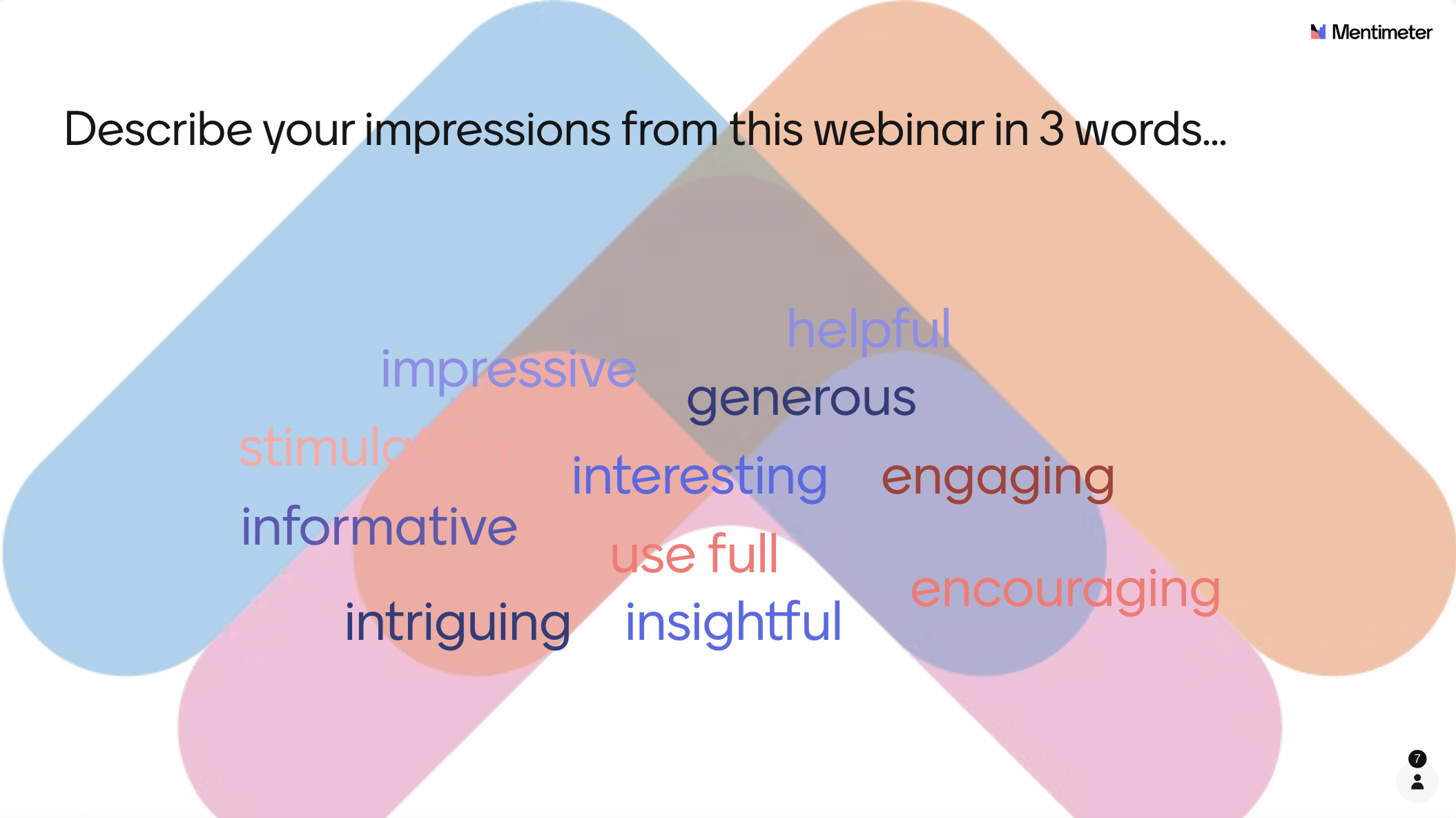
Re-watch the webinar
Insights from “Cities Learn: Impact Garden Framework”, presented by Unity Effect
Webinar 16, 10.06.2025, hosted by ECoD NPO / 114 participants
The Impact Garden Framework offers a regenerative approach for city leaders to navigate complexity and foster systemic change across sectors. This webinar, hosted by ECoD with Unity Effect, introduces the framework using real-world examples from Barcelona and Vienna. By viewing cities as living systems, the framework provides a shared language and tool to simplify complexity, energize participatory evaluation, translate strategies into impactful implementation, and cultivate collaborative ecosystems. Participants will gain a tool applicable to various initiatives, helping to make urban transformation visible, actionable, and lasting.
In conclusion, this webinar was well-received and exceeded the participation targets:
- Laila Martins and Jannik Kaiser, from Unity Effect, presented the Impact Garden guiding framework, a regenerative evaluation and collaborative approach aimed at peer learning, inclusive growth and systemic change in cities and organisations. Both presenters fostered an open dialogue with representatives from Barcelona and Vienna, who explored how Impact Garden’s framework can be applied across varying city contexts.
- Antonia Sanches Hernandez, from the Barcelona City Council, shared how Barcelona utilised Impact Garden to create an “interconnected ecosystem” through simple, but engaging evaluations and dialogues. She emphasised how this approach supports urban development in a sustainable, inclusive, and accessible way.
- Marlene Fuchs, City Planner for the City of Vienna, described how Impact Garden has served as an effective participation tool. She highlighted the framework’s co-creative and participative characteristics that enabled for multilateral collaboration and citizen engagement.
Through a regenerative paradigm that focuses on inclusivity and participatory action, Impact Garden is able to support changemakers focusing on both immediate and long-term systemic changes.
Impressions from the webinar:
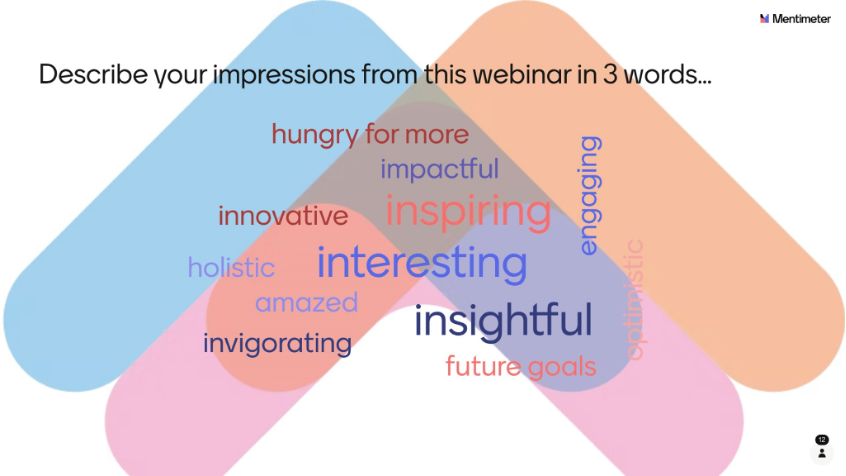
Re-watch the webinar
Insights from “Cities Meet: ACT NOW Mayors’ Conference Vienna – A Fair and Just Transition”
ECN Meeting 6, 04-06.05.2025, hosted by ECoD NPO / 56 participants
Members of the European City Network (ECN) gathered at the ACT NOW Mayors’ Conference in Vienna – the City that currently holds the title of European Capital of Democracy. The ACT NOW Mayors’ Conference is an annual international gathering that connects experts, mayors, and young innovators to address pressing global challenges through local innovation. This year, a two-day conference took place in the Vienna City Hall on May 5-6, 2025, and was centered around the theme “Just Transition: Local Action for a Sustainable Future”. Prior to the beginning of the Conference, ECN representatives were welcomed on May 4, 2025, at Café Kunsthalle for a networking and exchange dinner.
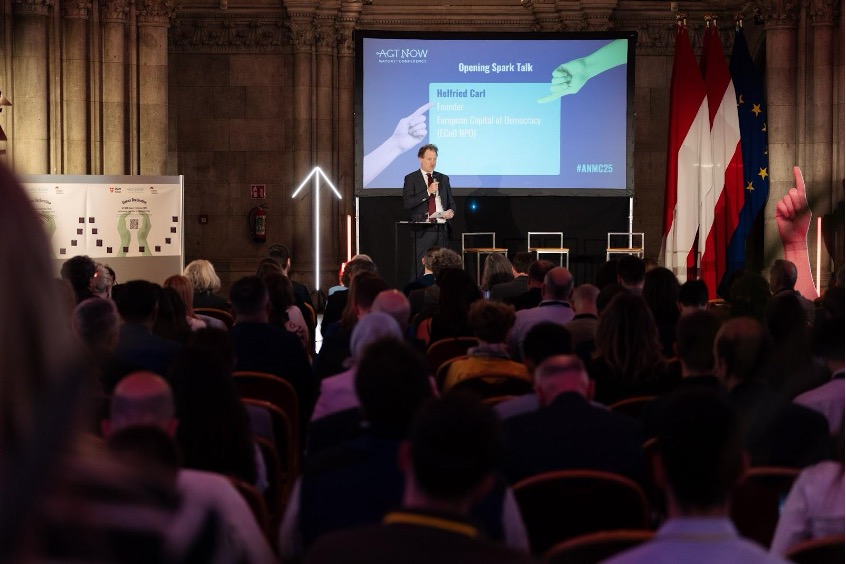
Pictured: Helfried Carl, Founder of ECoD NPO
At the ACT NOW Mayors’ Conference, ECN Members had the opportunity to network with mayors, international organisations, municipal leaders, young innovators, and sustainability. At the same time, ECN members shared initiatives and best practices that their cities are implementing to contribute to a just and sustainable transition. Some of the workshops where European City Network representatives presented their approach include:
Best Practice Exchange 2: Biodiversity and the Transformation of Urban Spaces – Insights from the European City Network
- Pedro Aguilera Cortés, Commissioner for Participation, City of Barcelona, Spain
- Barbara Tusk, Deputy Director for Public Spaces in Gdansk Department of Green Areas, City of Gdansk, Poland
- Gisela Martins, Head of the Environment Division, Municipality of Valongo, Portugal
Best Practice Exchange 3: Blue-Green Infrastructure and Housing – Insights from the European City Network
- Carla Nunes Semedo, Executive Councillor for Health, Social Affairs and Human Rights, City of Cascais, Portugal
- Michalis Tsoupakis, Deputy Mayor, City of Chania, Greece
Panel Discussion: Creating a Legacy – The European Capitals of Democracy
- Carla Nunes Semedo, Executive Councillor for Health, Social Affairs and Human Rights, City of Cascais, Portugal
- Pedro Aguilera Cortés, Commissioner for Participation, City of Barcelona, Spain
- Nina Abrahamczik, Member of the City Council & Chair of the Committee for Climate, Environment, Democracy and Personnel, City of Vienna, Austria
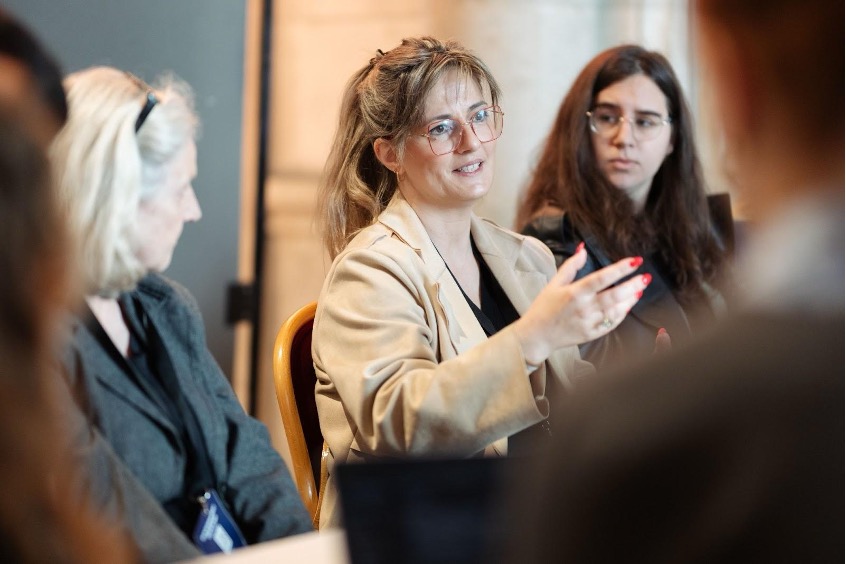
Pictured: Gisela Martins (centre), City of Valongo
During these sessions, ECN members shared the best practices that their cities are implementing to contribute to shaping a more sustainable society. Commissioner Aguilera discussed a participatory budget approach to transforming urban spaces, while Deputy Director for Public Spaces, Barbara Tusk, shared how her city is creating biodiverse greenspaces – microforests – in dense urban areas. Gisela Martins, Head of Environment Division, Carla Semedo, Executive Councillor for Health, Social Affairs and Human Rights, and Michalis Tsoupakis, Deputy Mayor of Chania, shared insight into how their cities are combining blue-green infrastructure and housing policy to address climate adaptation and social equity.
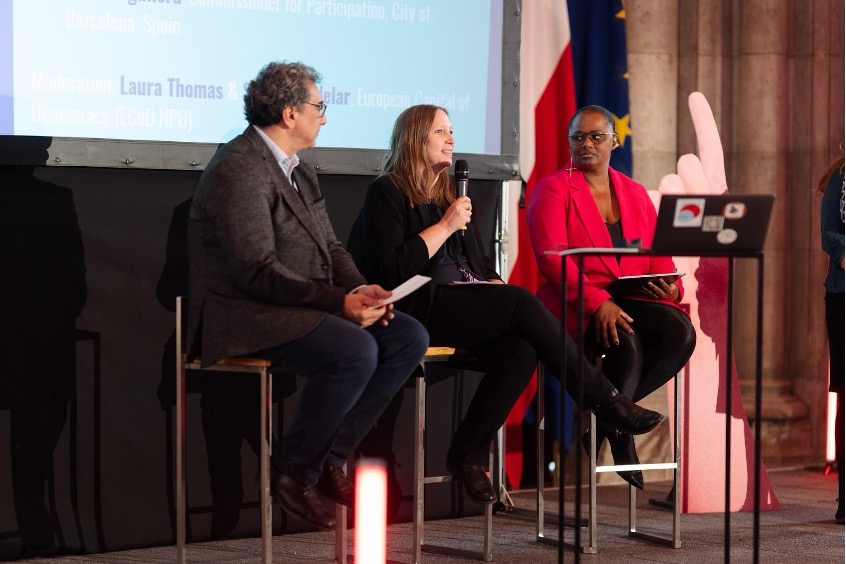 Pictured: Pedro Aguilera, City of Barcelona (left), Nina Abrahamczik, City of Vienna (right), Carla Semedo (right), City of Cascais
Pictured: Pedro Aguilera, City of Barcelona (left), Nina Abrahamczik, City of Vienna (right), Carla Semedo (right), City of Cascais
Finally, representatives from the former (Barcelona), the current (Vienna), and the future (Cascais) European Capitals of Democracy reflected what the title truly means to their City, and shared the challenges they faced, as well as the positive impact that this title still has on their city. They highlighted how being part of the European City Network encourages the opportunity to strengthen democracy across Europe.
Insights from “Cities Learn: Data Feminism – a tool for building more equitable cities”, hosted by the City of Bologna, with guest expert Giulia Sudano
Webinar 15, 20.05.2025, hosted by the City of Bologna / 112 participants
Giulia Sudanno, Co-Founder of Period Think Tank, presented the seven principles of data feminism. She described how a feminist lens emphasises the need to challenge power dynamics and analyse hierarchies, as well as promoting the collection of qualitative experiential data. This means the analysis also considers the context. Disaggregating data by gender facilitates Gender Impact Assessment, which is fundamental to developing policies to create more equitable cities. In Bologna, gender mapping measures parameters such as social vulnerability, access to welfare services, care-giving burden, and economic dependence as part of its assessment of municipal services according to need and current infrastructure. Such data collection and analysis should be mandated as European policy to ensure gender equity goals can be achieved.
Impressions from the webinar:
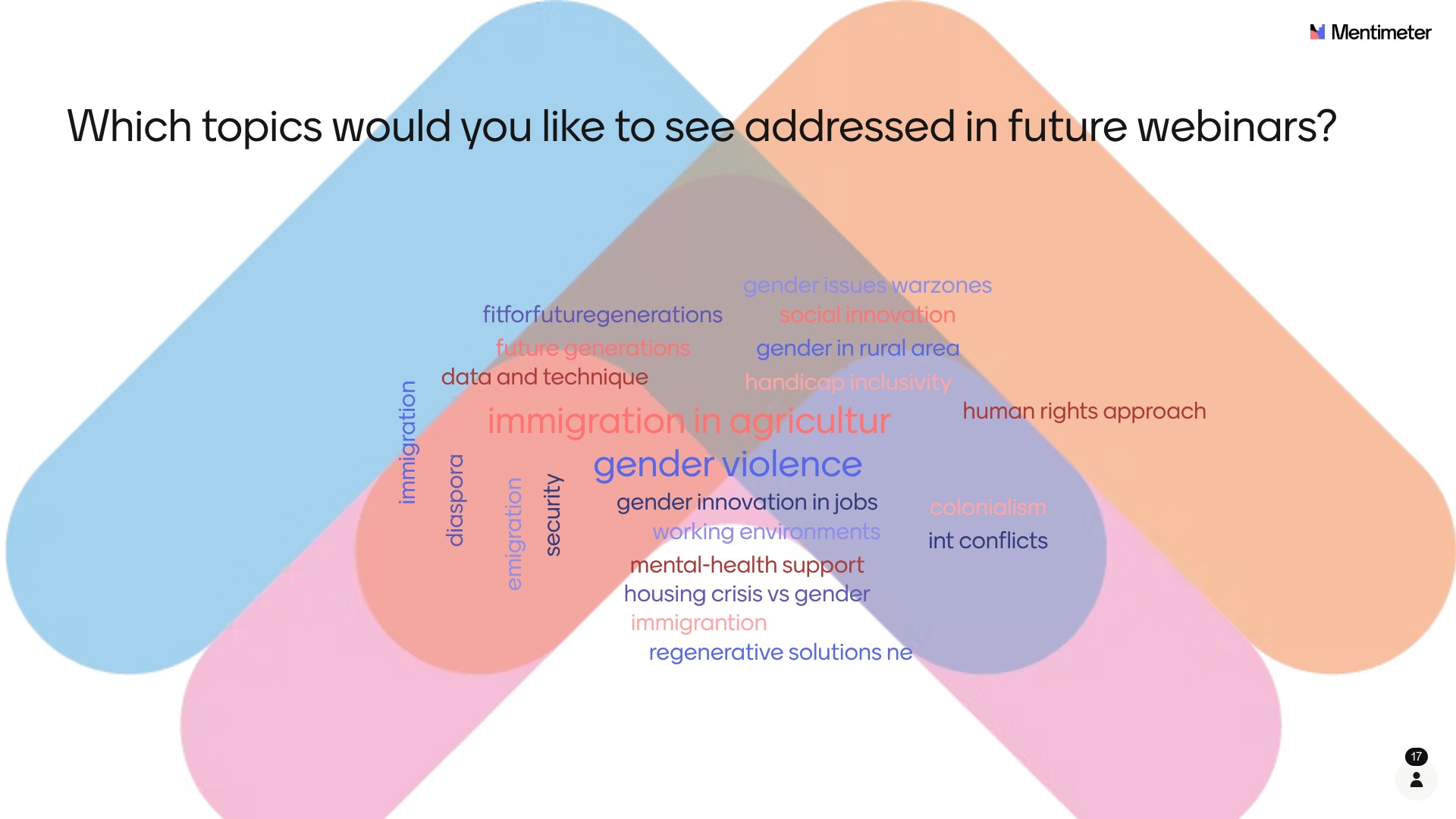
Re-watch the webinar
Insights from “Cities Teach: Diversity & Inclusion”, hosted by the City of Bologna
with contributions from Antwerp and Rotterdam
Webinar 14, 40.04.2025, hosted by the City of Bologna / 118 participants
Beatrice Collina, Project Manager at the Rights, International Cooperation & New Citizenship Unit, presented the Municipality of Bologna’s innovative participatory process of co-reviewing municipal services with a view to improving them for all residents, and particularly those with a migrant background. The pilot was developed in the framework of the European Project UNITES, with a focus on the educational services and three main goals: to reach and involve people with migrant background; to improve the accessibility and inclusivity of educational services; and, to develop a model to be employed and replicated even in other contexts.
Karen Milants, Youth Leisure-Time Policy Officer for the City of Antwerp, described how the city has analysed, improved, and developed the accessibility of leisure activities for children and youngsters with special-care needs. Specifically, Karen emphasised the importance of shared knowledge from various professionals in order to create inclusive spaces for young people and children with special care needs. It was also noted that it is not necessary to create new initiatives but that improving existent initiatives and making those more inclusive and accessible is equally effective. She presented the example of a training programme for organisations, which includes classroom training, intervision, and on-the-job support.
Shantie Singh, Senior Policy Advisor on Domestic, Gender-Based & Honour-Related Violence for the City of Rotterdam, gave an overview of the city’s approach to gender-related violence, with an extra focus on tackling honour-related violence. Using the city’s neighbourhood approach, Rotterdam works together with key community stakeholders and with survivors of domestic violence, who are experts by experience, in order to tackle this issue in an effective way that also respects cultures and traditions.
Impressions from the webinar:
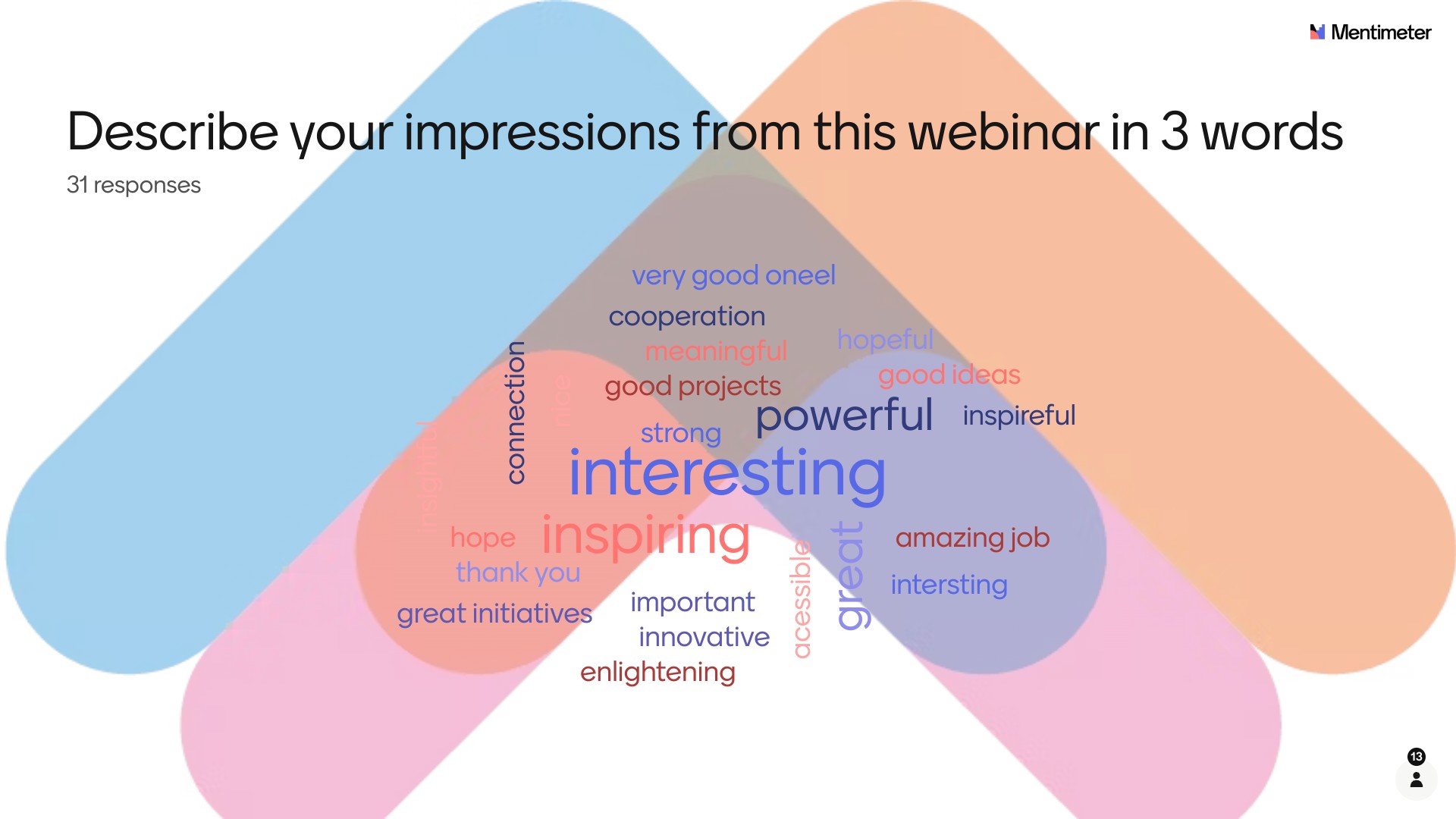
Re-watch the webinar
Insights from “Cities Meet: Diversity & Inclusion” in Bologna
ECN Meeting 5, 15.-17.04.2025, hosted by the City of Bologna / 31 participants
We began this European City Network meeting on Bologna’s beautiful Piazza Majore, where representatives from cities across Europe made their way into the Salla della Musica, marveling at the welcoming library and decorated wooden ceiling. Vice Mayor Emily Mation Clancy (Equal Opportunity, Gender Politics, LGBTQ Rights, & Anti-Discrimination) and Deputy Mayor Anna Lisa Boni (International Relations & Climate Neutrality) opened the meeting with a welcome address, before we met Diversity Manager Daro Sakho, one of five volunteers who have been appointed by the Mayor to support the City Government on issues such as integration, disability, and inclusivity.
The next morning, we made our way to LGBTQI+ Centre Cassero, where the General Co-operation Pact between the Municipality of Bologna and 36 local LGBTQ associations was presented. The group enjoyed exploring the space, a former salt cellar, which has become a hub and safe space for members of the LGBTQI+ community. Guided by two enthusiastic and knowledgeable volunteers from the centre, we learnt about how the space is also open to the wider community through disco nights, which offer a low-threshold and inclusive way of supporting and participating in the centre’s activities.
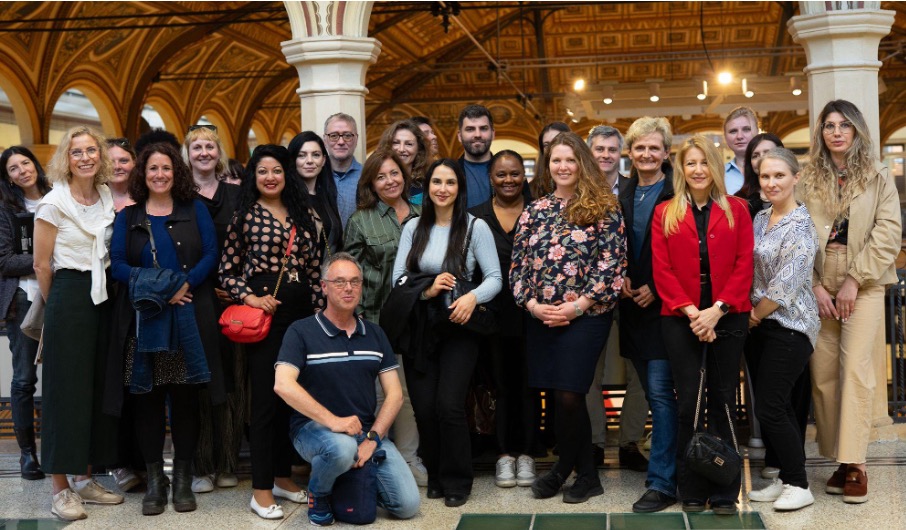
A short bus ride took us to Centro Interculturale Zonarelli, Bologna’s Intercultural Centre, which is home to over 150 associations representing migrant communities. This space serves two main functions: providing a space for local Bolognese residents to meet immigrants, as well as being a place of intercultural integration and dialogue. The Centre hosts language courses (both Italian and mother tongue) as well as a multitude of cultural and religious festivals and events. Thus, the centre provides an important channel of communication between the municipality and various communities and cultural associations.
Moving a bit further away from the centre of town, we travelled to SALUS Space, an innovative social housing project. After a delicious home-cooked Syrian lunch, we learnt more about the project, which began in 2021. The idea was to provide affordable housing and job opportunities for a mixed community of residents – 15 different nationalities of all ages and backgrounds. Beautifying a previously neglected site and creating a restaurant, workshop spaces, and a community garden with a monthly farmers market has transformed the attitudes of the residents from surrounding areas. Those who were previously sceptical about having a social housing project in their neighbourhood, now value and use this space.
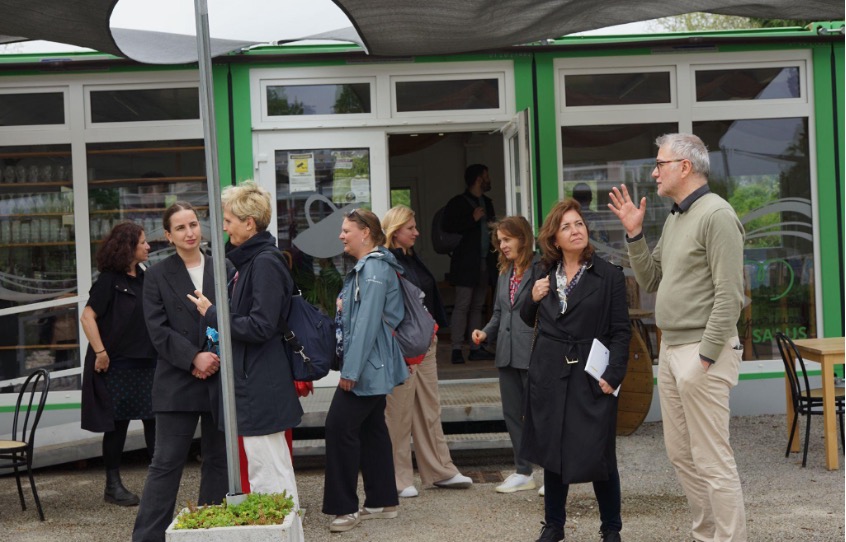
On the final morning of the visit, we returned to the Salla della Musica to learn about Bologna’s efforts in terms of preventing gender-based violence. Anna Clora Borghesi and Beatrice Collina from the Rights & Equal Opportunities Office told us about Bologna’s Gender Atlas for a Feminist City, the new safe-spaces that have been created (Tutta mia la città), as well as a Map to Stop Violence. Following which we learnt about SENZA Violenza’s behavioural-change programme, which engages with men who use violence against women and children, which was presented by Giuditta Creazzo and Francesco Corona.
Presentation
ECoD Presentation
Conclusion
In conclusion, throughout our stay in Bologna, we were struck by the way the Municipality, community and associations work together to make the city the progressive, inclusive and diverse place that it is. Many thanks to our wonderful hosts and all the people we met over the past days.
Insights from “Cities Teach: Inclusive Social City Development”
Hosted by the City of Cascais
with contribution from the City of Krakóv
Webinar 13, 25.03.2025, hosted by the City of Cascais / 136 participants
Tiago Leitão, President of Aproximar – Social Innovation Cooperative’s presentation highlighted the City of Cascais’ strategies for creating and strengthening Social Innovation Clusters as drivers of sustainable development and social cohesion. He went into detail about the collaborative approaches used in order to engage organisations, communities, and both the public and private sectors.
Mateusz Płoskonka, Deputy Director, Department of Dialogue, Consultations & Citizen Contact for the City of Krakow Office, presented the City of Kraków’s impressive infrastructure put in place to support participation within the city. His presentation focused on initiatives related to civic engagement and community development in Kraków, highlighting successful projects that foster collaboration between citizens and local authorities.
Impressions from the webinar:
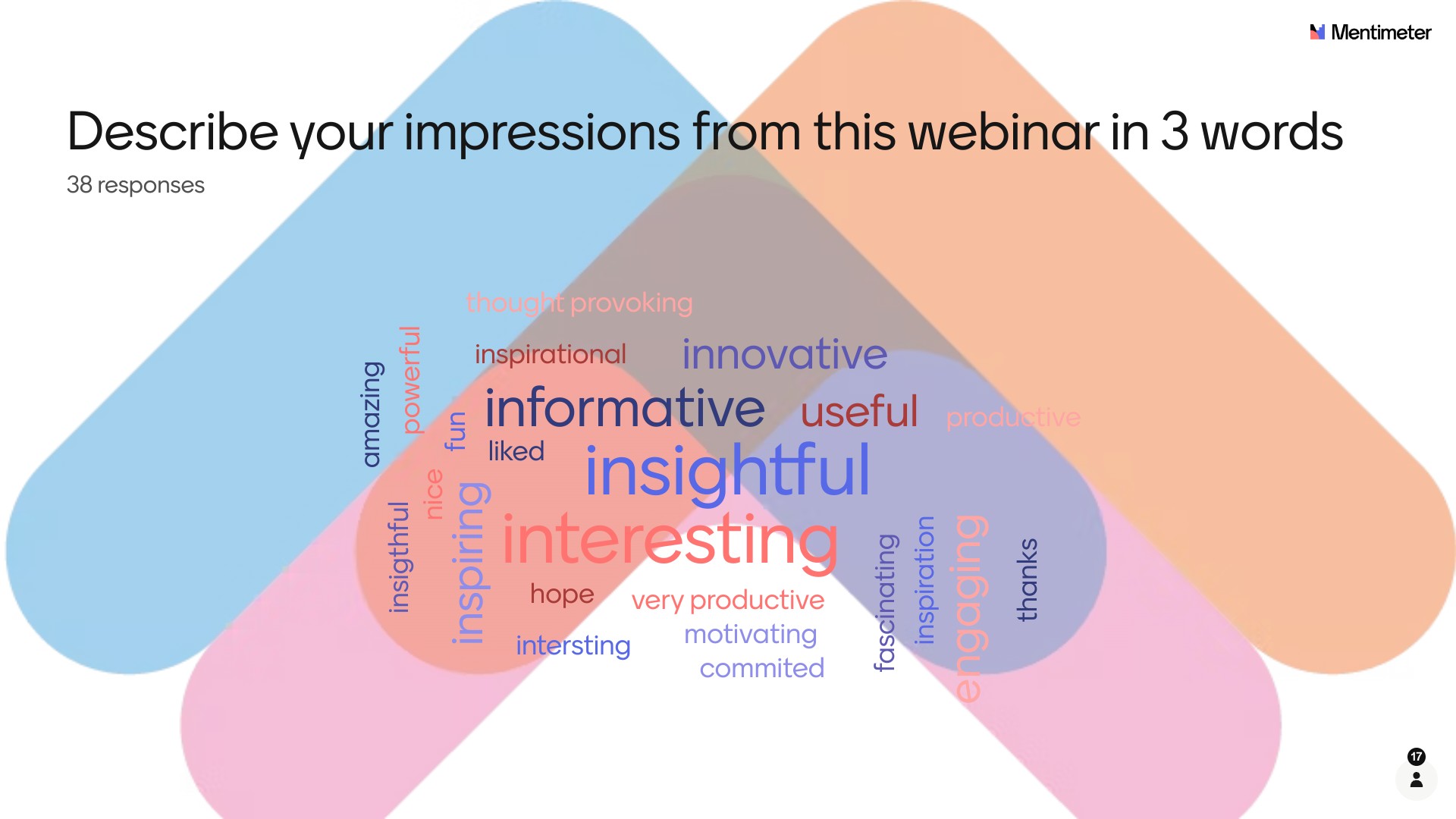
Re-watch the webinar
Insights from “Cities Learn: Communities in Action”, hosted by the City of Cascais with Councillor Carla Semedo
Webinar 12, 11.02.2025, hosted by the City of Cascais / 147 participants
Carla Nunes Semedo, City Councillor for Social Cohesion, Urban Development & Inclusive Public Policies at Cascais Municipality, gave us an insight into the Communities in Action programme. This initiative fosters urban regeneration and social inclusion in vulnerable areas through synchronised, community-driven solutions. Carla spoke about how reversing persistent patterns of social fracture can create meaningful and lasting impacts in fragile communities.
Impressions from the webinar:
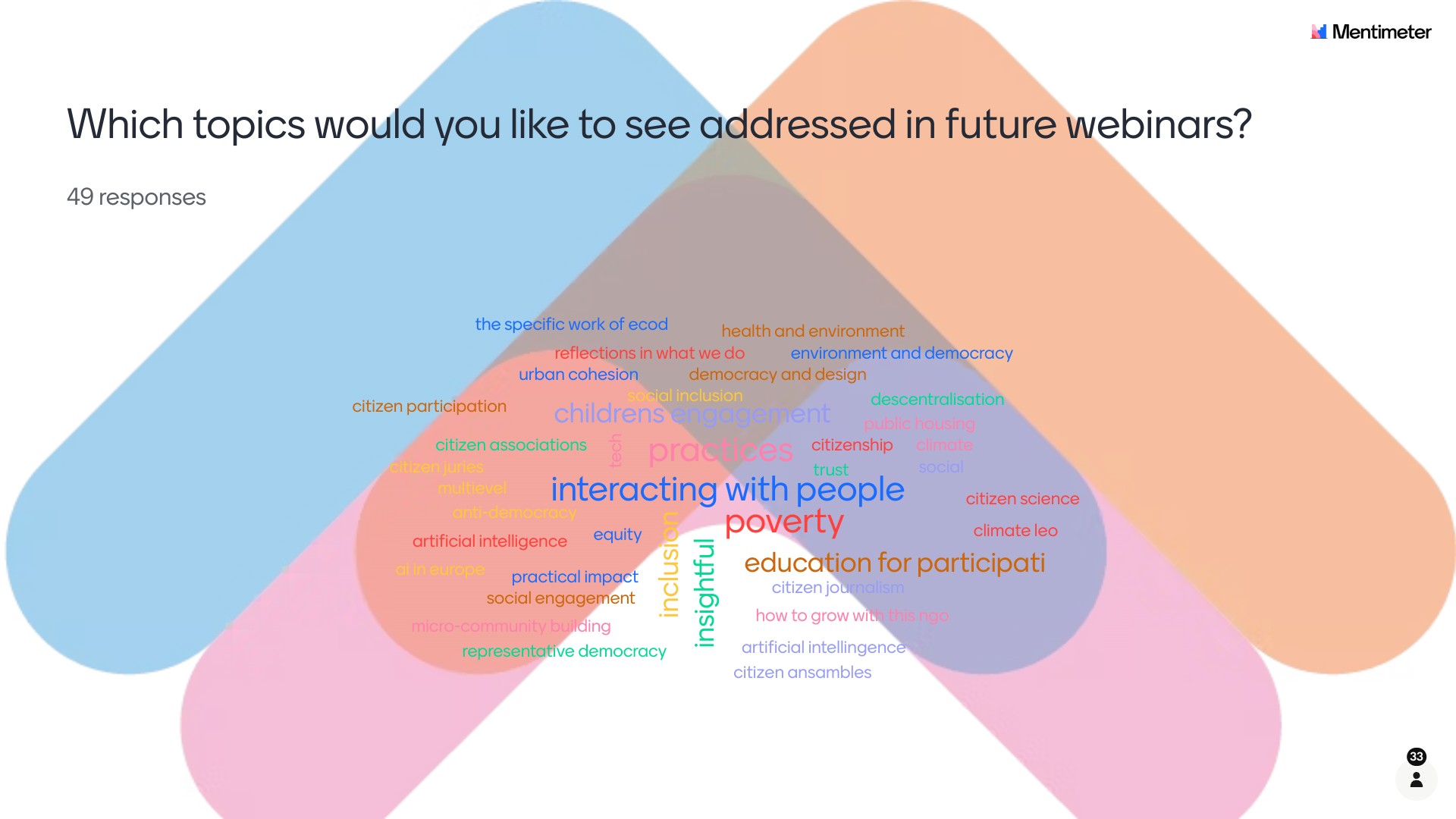
Re-watch the webinar
Insights from “Cities Meet: Inclusive, Social City Development” in Cascais
ECN Meeting 4, 26.-28.02.2025, hosted by the City of Cascais / 33 participants
The European City Network gathered together for our first meeting of 2025 in the beautiful seaside city of Cascais, Portugal. Representatives from thirteen countries in our network meet up at the hotel before taking a bus to Quinta do Pisão in the mountains above the city. After a short walk and a brief welcome presentation, we stepped out into the dappled sunshine under the trees. There we found the rhythm as a group and together created a soundscape of democracy. The group then enjoyed an interactive presentation about the City of Cascais’ work in the topic field of Inclusive Social City Development. Following a short break we made our way to the restaurant for dinner, meandering through the cobbled streets of the city centre before enjoying pizza and sangria!
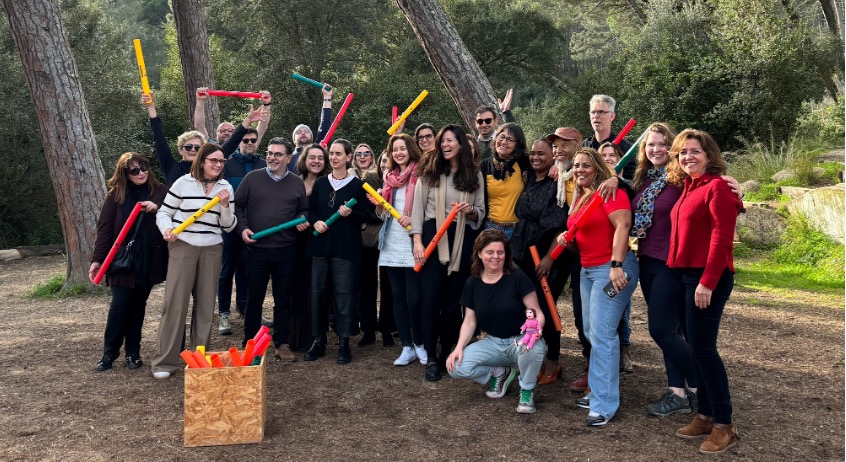
The next day we set off to the Vida Cascais Social Innovation Station where we learnt about how the city integrates essential services to tackle social challenges, providing access to healthcare, housing support, employment initiatives, social assistance, and youth programmes, all within a single location. The station serves as a one-stop access point for services, exemplifying Cascais’ holistic approach to equity, social cohesion, and community well-being. We then crossed the road to Espaço S – Youth Wellbeing Hub where our network members gave short best-practice presentations from their own cities on the focus topic.
After lunch, we visited the Community Centre of the Parish of Carcavelos. This Private Social Solidarity Institution includes a senior university, childcare facility, impressive homeless service, as well as a social supermarket with reduced prices for essential goods. Here we tucked ourselves away in a room for the second workshop of the day, during which we learnt more about each other’s job roles and how they support Inclusive Social City Development. After a packed day of learning and exchange, the group was looking forward to the networking drinks reception and dinner at the Cascais Cultural Centre, which didn’t disappoint!
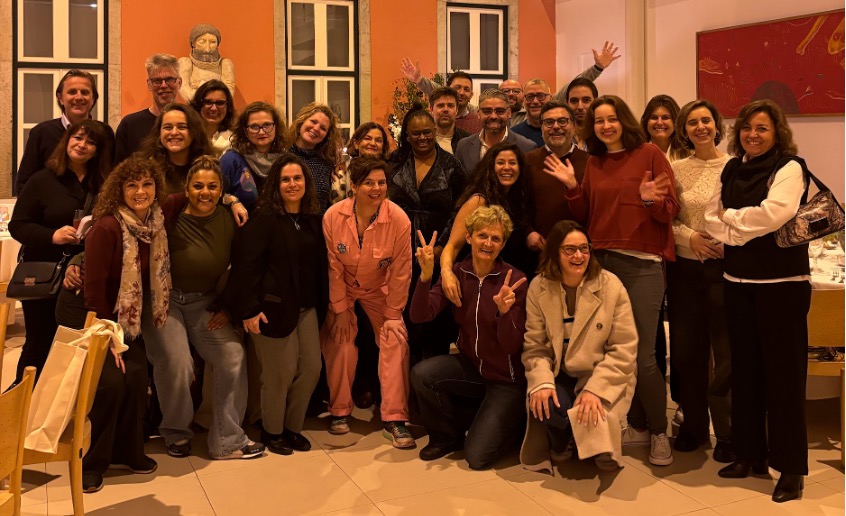
On the final day of our trip, we headed to the Santa Maria do Mar Monastery to learn more about the successful Terras de Cascais Programme, a community-driven urban agriculture programme that transforms underutilised spaces into productive green areas, fostering social inclusion, sustainability, and local food security. After a brief presentation and a well-deserved coffee break, we explored the regenerative vineyards and community gardens, as well as the student accommodation. A final Reflection Round helped us take stock of what we had learned and the new and familiar people we had met over the past days.
A final lunch overlooking the Atlantic was the perfect way to round off a wonderful few days. Thank you to the dedicated team in Cascais for putting together such an informative programme… we look forward to seeing more of you in Cascais’ Democracy Year in 2026!
Presentation
Best-Practice Presentations
Conclusion
In conclusion, the team in Cascais curated a very memorable visit which left us all inspired by the many inclusive and social development practices and projects run by the City and its affiliated associations. The deliverable was achieved as more than 30 participants from 13 countries attended.
Insights from “Cities Learn: Disinformation in the City” with guest experts Paul Costello and Ika Trijsburg +
“Disinformation in the City 2.0” with guest experts Paul Costello, Graham Wetherall-Grujić and Mathis Dippon, hosted by ECoD NPO
Webinar 11, 12.+18.12.2024, hosted by the City of Cascais / 126 participants
Jessica (Ika) Trijsburg, Research Fellow in City Diplomacy at the Melbourne Centre for Cities, presented the findings of a collaborative research project she led, looking into how cities connect and collaborate to address shared and complex challenges, in this case, disinformation. She highlighted the important role cities play, as the most trusted level of governance, and the opportunities of harnessing the collective intelligence of a group of diverse city specialists. In order to build trust and community, any disinformation response must be non-partisan and support the rights of people to express dissent and protest freely.
Paul Costello, Senior Programme Manager for the German Marshall Fund’s Cities Programme (Berlin Office), reviewed the 10 principles that resulted from the collaborative research project. He also highlighted the importance of the four spheres of trust – trusted institutions, information, people and places – and that building trust goes hand-in-hand with building community. This understanding is the foundation of working along the disinformation continuum of preemption, spread prevention, debunking, recovery or resilience, and sense-making.
Graham Wetherall-Grujić, Lead Expert for Democracy Technologies at the Innovation in Politics Institute, discussed a notorious example of misinformation against green energy in Germany, which illustrates how complicated identifying and diffusing disinformation can be, and why fact checking alone is not enough. Interestingly, community ownership appeared to be an effective measurement to diffuse disinformation against wind farms.
Mathis Dippon, Democracy Year Manager at European Capital of Democracy NPO, presented Truth, Lies & Democracy –a key format in the European Capital of Democracy’s Democracy Year events. He gave an overview of what went down at the game jam in Barcelona this year as well as an insight into what’s planned for this event in Vienna 2025 and how you can get involved.
Insights from “Cities Teach: Three best-practice examples of Senior & Intergenerational Participation, hosted by ECoD NPO with contributions from Antwerp, Barcelona and Bratislava
Webinar 10, 20.11.2024, hosted by ECoD NPO / 117 participants
Andrea Bardyn, Deputy Branch Director at Duo for a Job and Marije Plantinga, Project Leader for Youth Unemployment for the City of Antwerp, described how the city works with DUO for a JOB to tackle the issue of unemployment using an intergenerational and intercultural approach to mentoring. By connecting young job seekers from migrant backgrounds with experienced mentors over 50, the organisation aims to promote labour equality while valuing the expertise of seniors. The results speak for themselves, with over 70% of mentees finding employment within 12 months, while also reporting improved language skills and an expanded network.
Laura Copete, Digital Inclusion Manager for the City of Barcelona, gave us an overview of the Cibernarium Digital-Skill Test. This innovative online tool helps citizens assess their digital skills and offers personalised recommendations for Cibernarium’s free, citywide online training activities. Moreover, by factoring in socio-economic factors such as age, income, immigration status, and education level; the aggregated results provide a detailed overview of Barcelona’s digital literacy landscape, allowing for tailored policies and programmes to address unique local needs and barriers.
Eva Surovková, Head of Department of Social Support for Seniors and People with Disabilities for the City of Bratislava, and Ingrid Tomešová, Support for Active Ageing and Prevention of Loneliness at the Department of Social Support for Seniors and People with Disabilities for the City of Bratislava, presented the “Support for Active Ageing and Participation of Seniors” project, including the “Council of Seniors for the Rights of Elderly Citizens” and the subsidy programme “Bratislava for All” which offers financial support to NGOs which focus on intergenerational solidarity and the improvement of quality of life for senior residents in Bratislava.
Insights from “Cities Learn: Intergenerational Approach of Braga’s Entrepreneurial Impact Programme”, hosted by the City of Braga with Carlos de Sousa Santos
Webinar 9, 30.10.2024, hosted by the City of Braga / 113 participants
Carlos de Sousa Santos, Co-Founder of the Human Power Hub, spoke to us about Braga’s intergenerational approach to entrepreneurship, which is fostered and supported by various programmes coming out of the Human Power Hub – the City of Braga’s Social Innovation Centre. Carlos presented his experience of running intergenerational programmes and discussed how the “Quadruple Helix” model is used to further integrate collaborative approaches to policy development. The Quadruple Helix is a hybrid model of social innovation which combines the strengths of civil society, the public, private and educational sectors, and citizens in a disruptive way.
Insights from “Cities Meet: Senior & Intergenerational Participation” in Braga
ECN Meeting 3, 15-17.10.2024, hosted by the City of Braga / 38 participants
ECN member cities host regular in-person network meetings (workshops), where representatives come together to share their expertise and best practices in democracy promotion at the municipal level. On a mid-Autumn’s day 38 European City Network members, from 13 European counties, gathered at Braga’s Educational Farm.
Here we were welcomed by Filipe Fernandes, Advisor to the Mayor, who told us how school children and the elderly volunteer at the Quinta, which provides food for local care homes and schools alike. In this way, the Quinta engages people across the generations as the elderly share their knowledge about traditional farming practices, while the youngsters enthusiastically harvest and process the produce.
Following this warm welcome address, Joaquim Castro de Freitas gave us an introduction to Braga’s intergenerational policies, addressing both the challenges the city faces in terms of multicultural integration across religions and generations. We also learnt about the City of Braga’s progress in terms of becoming a certified Child-Friendly City. After a short walk around the farm the group regathered for a traditional Portuguese evening meal.
The next day, we walked to Braga’s Youth Centre, which doubles up as a Youth Hostel. This not only facilitates engagement with people of all generations from around the world, but also means the Centre is financially self-sustaining. Here we also took the opportunity to use their dynamic living room space for a workshop in which our member cities could take a deeper dive into some of the common challenges they face in terms of Senior & Intergenerational Participation. Using the Personas methodology, we focused on 3 common challenges: the culture of aging; public spaces for all generations; and, digital participation and integration.

After lunch and a short coffee break, we visited the Human Power Hub. Here, Carlos de Sousa Santos, co-founder of the Human Power Hub, presented Braga’s Social Innovation Centre’s experience of running intergenerational programmes. This Social Innovation Centre establishes a hybrid model of social innovation which combines the strengths of civil society, the public, private and educational sectors, and citizens in a disruptive way. We were given a tour of the facilities, and even allowed to play with their lego!
We then learnt more about the current projects to come out of the Innovation Centre, namely ACT 0 to 100 and UM novo lar (A New Home). The former project looks to combat social exclusion and loneliness, with a particular focus on the Roma community. By promoting interconnection between different generations and fostering empowerment and autonomy throughout a person’s life, ACT 0 to 100 reinforces social and intergenerational cohesion. Whereas Um novo lar promotes an intergenerational living experience through the sharing of accommodation between a senior person and a university student.
After a long day of intensive workshops and presentations, the group enjoyed a networking drinks reception. A short break allowed participants to explore a little of Braga’s historic city center before we gathered again for an evening meal.
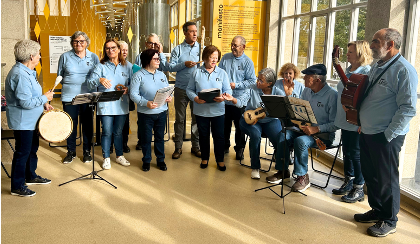
On the final day, we once again strolled together though Braga’s streets and into the Municipal Market, which is host to Braga’s Senior Academy. Here we were treated to a fantastic performance of traditional music, singing and dancing by some of Braga’s oldest residents. It was a wonderfully heartwarming end to a fantastic few days learning more about how to engage citizens of all generations. We rounded up the visit with a Reflection Round where we gathered personal and professional highlights, as well as feedback on how to improve the experience for next time.
Presentation
ECoD Presentation
Conclusion
In conclusion, the team in Braga curated a very memorable visit which left us all inspired by the many intergenerational practices and projects run by the City and its affiliated associations.
Insights from “Cities Learn: Sociocracy – Democracy as it could be”, hosted by ECoD NPO with guest expert Barbara Strauch
Webinar 8, 12.09.2024, hosted by ECoD NPO / 150 participants
Barbara Strauch, Certified Sociocracy Expert CSE and Auditor for Educational Programmes in the Association of German-speaking Sociocracy Centers, gave us an introduction to Sociocracy and it’s four founding principles:
1- Consent principle – decision-making with consent
2- Circle principle – semi-autonomous circles
3- Double linking – circles are always connected by two people
4- Open elections – elect people for tasks and roles by consent
She then handed over to the four guest speakers who gave us in insight into their experiences of sociocracy in practice:
– Naya Tselepi, Dr. Human Geography, PostDoc Researcher and Educator, Appointed Lecturer University of Thessaly, CSE, Elliniko Kentro Sociokratias, spoke about the first sociocracy-based Youth Council. Also borrowing from the Indian concept of “neighbourocracy”, the Youth Council managed to reinvigorate the local youth community to engage in local activities and actions.
– Florian Bauernfeind, Consultant and Facilitator for Participation, CSE, CEO of Sociocracy Center Austria, gave us an insight into how the Sonnwend District in Vienna is empowering its residents to take meaningful action to address local issues by implementing a sociocratic neighbourhood council.
– Pia Haertinger, Dr.Phil., City Councillor in the City of Augsburg and Chairwomen of Sociocracy Center Augsburg, presented the regeneration of a neglected area into a playground guided by sociocratic practitioners. A key learning from this process is that patience, persistence and creativity builds a community from the ground up.
– Rita Mayrhofer, Dr.DI Senior Researcher, Boku University (ILAP, Vienna) and Chairwomen of Sociocracy Center Austria, spoke about a group of villages who implemented sociocratic decision-making at the local council level. This process resulted in greater levels of trust in political representatives and generally more political engagement.
Insights from “Cities Teach: Democratic, Social & Digital Inclusion”, hosted by ECoD NPO with contributions from the Linz and Kyiv
Webinar 7, 31.07.2024, hosted by ECoD NPO / 147 participants
Silvia Hackl, Head of Innovation & Participation in the Department for Economy, Innovation, Climate Protection & the EU of the City of Linz, presented the Create Your City initiative. This project came about as a positive response to a brief period of civil unrest in 2022 where, predominantly young people, rioted in the streets of Linz. Realising the City needed to find a way to include the voices of young people, a series of participation workshops were developed enabling them to co-creating their city. Every month classes of school children are invited to the Old City Hall and Municipal Council Chamber to share their views on the city and to actively shape the places they frequent.
Victoriia Itskovych, Chief Information Officer of the City of Kyiv City, presented the city’s experience of implementing Citizen-Driven Democracy. The on-going conflict in Ukraine has brought into sharp focus how digital tools are particularly agile and useful in the face of a rapidly changing security situation. An app which had previously facilitated “ordinary” citizen life (parking passes, public transport tickets, petitions, etc.) has quickly been adapted into a life-saving tool which alerts citizens to air raids and maps the city’s bomb shelters. Kyiv’s residents know all too well that, despite the war, life still goes on. Digital tools enable them to make decisions remotely, when it’s too dangerous to gather many people in one place or to travel across the city, such as via the Condominium E-Voting platform.
Laura Thomas, European City Network Manager at the ECoD NPO, presented a sneak-peek into the 3rd call for the next European Capital of Democracy 2026. She gave an outline of the application process, including the pre-requisites, timeline, and evaluation and selection procedures. If you’re interested in learning more about applying to become ECoD 2026, please pre-register your interest here and book one of our information and exchange workshops.
Insights from “Cities Teach: Youth Participation”, hosted by the City of Antwerp with contributions from Barcelona
Webinar 6, 16.07.2024, hosted by the City of Antwerp / 116 participants
Wim Seghers, Play Space Expert at the City of Antwerp’s Youth Department gave us an introduction to the “playspace web” method and how it’s developed in his presentation “how to create a child-friendly network in your city”. His presentation highlighted the importance of taking children seriously as experts of their own neighbourhoods. They know the best and the worst places in the area and can also provide useful data on which routes they take to move around the city and by which modes of transport. The City of Antwerp introduces play features that allow children to jump on/off, follow and interact with the built environment. Often these features also fit with the City’s plans to green the urban environment and make it more climate resilient, for example with play fountains cooling down the youngsters on hot summers’ days.
Laia Pineda, from the Childhood and Adolescence Institute Barcelona, shared the City of Barcelona’s experience of implementing the “Children Have Their Say” project. Barcelona takes a rights-based approach to youth participation – children have the right to be heard and it’s important that the City understands childrens’ wellbeing from their own perspective. Interactive workshops with over 2000 children resulted in the Children’s Agenda. One major challenge is ensuring adequate representation of the group of children involved in developing the agenda, which can be partly mitigated by encouraging peer-to-peer communication about the initiative and what it means for the children of the city.
Konstantina Chrysostomou, an activist at the Estel co-operative, presented the “Volem Decidir!” (We want to decide!) process which took place in the City of Barcelona. This process empowers children and young people to participate in city life in a way that they find fulfilling. Like the “Children Have Their Say” project, children of eight years and older took part in the process, which also consisted of workshops which aimed to find out more about the children’s community, topics of interest, and ideas about participation. Broken into two age groups (8-11 year old and 12 to 17 years old), each group had different priorities and topics of interest. The youngest children focused on bullying, poverty, and protecting animals, while the older group were interested in well-being, public spaces, and housing.
Insights from “Cities Learn: Growing Up in Poverty, a trauma-sensitive approach”, hosted by the City of Antwerp with guest expert Ybe Casteleyn
Webinar 5, 20.06.2024, hosted by the City of Antwerp / 135 participants
In this webinar, Ybe Casteleyn underlined the importance of being aware of the impact of trauma in both our personal and our professional lives. We learnt that traumatic stress comes in many different forms, including shock, chronic stress and PTSD. Complex trauma has a severe impact on the emotional, mental, and physical development of children, as well as affecting their sense of self and belonging. Trauma-informed care helps people realise the impact of traumatic stress and recognise the signs of trauma. Through this understanding, those who have experienced trauma can learn techniques to help them regulate themselves in healthier ways, and not resort to unhealthy coping mechanisms.
ECN Meeting two:
Cities Meet: showcasing the City of Antwerp’s Youth Participation projects and initiatives
14.-16.05.2024, Antwerp
52 participants from 13 countries (48 from 11 eligible for CERV)
Insights from “Cities Meet: “Showcasing the City of Antwerp’s Youth Participation Projects”
ECN Meeting 2, 14-16.05.2024, hosted by the City of Antwerp / 52 participants
The second workshop from 14-16 May with the focus on “Youth Participation” took us to Antwerp, Belgium.
The Belgian sun shone on us once again, as over 50 representatives from 13 European countries came together in the City of Antwerp for the 7th European Capital of Democracy’s City Network Meeting. We met at the Central Station to pick up our bikes at the beginning of a three-day programme which focused on showcasing the City of Antwerp’s Youth Participation projects and initiatives. As the group prepared to cycle through the busy city centre, some of us thought back to the last time we rode a bike… for a few of us that was a very long time ago!
First stop was MAS (Museum Aan de Stroom), a groundbreaking museum about global connections between people. Here we got to know each other a little better and received a warm welcome from the Alderman for Education, Youth and Integration, Jinnih Beels. We also learnt more about the City of Antwerp’s Youth Participation Policy, with an insightful presentation on the ComPas programme. After a short Flemish Break, we got stuck into an interactive workshop on how to motivate adolescents using the ABC model.
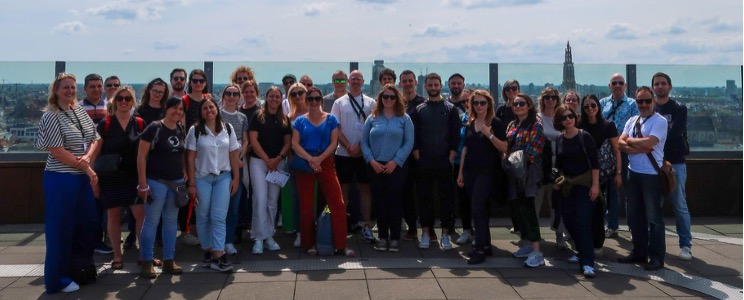
Later that evening, we were back on our bikes and cycling though some of Antwerp’s luscious Garden Streets, which were designed through a participative process involving the residents. Our destination – Betonne Jeugd (Concrete Youth), an organisation for young people in poverty who unite and emancipate themselves through leisure activities. It offers a safe home-base, a warm nest where they can come and chill, play football, cook together, and be young. We experienced one of the offers young people visiting this organisation enjoy – live pizza bakery and a delicious dinner!
The following day was not the picture of sunshine we were getting used to, but the damp weather didn’t dampen the mood as we arrived at StampMedia, Flanders’ first youth media agency amplifying the voice of young people. We saw the impressive range of facilities, equipment, and knowledgeable mentors available to all young people who have an interest in journalism or sharing their own stories. A quick hop across the alleyway and we were in the Permeke Youth Library – created in collaboration with adolescents, this is a space they can call their own and use to explore writing and art, or use as a social meeting place.
A short bike ride took us to SPRK, where we admired the multifunctional space made available for young people to explore urban sports and culture. We then made our way to STORMKOP, an impressive organisation located in the city’s old dry docks (Droogdokken) which is an out-of-the-ordinary free state for young and not-so-young adventurers immersed in a world of art, philosophy, science, sustainability, and adventure. After a lunch break, we explored the site with an audio guide outlining the substantial redevelopment plans for the site.
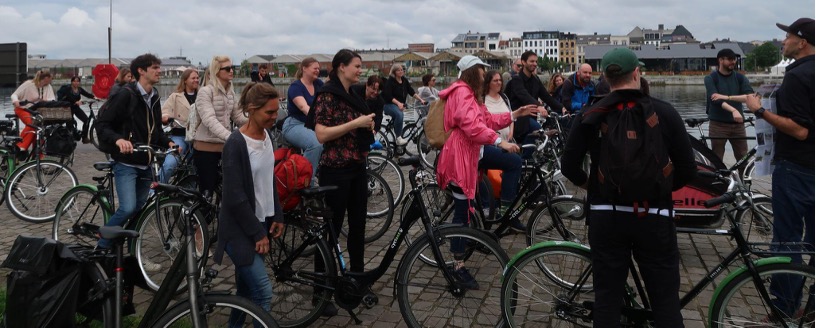
The sun started to peek through the clouds, as we set off on our bikes once again to explore some of the results of the City of Antwerp’s Play Web Policy in situ. The City of Antwerp has been committed to child-friendliness and greening in urban development for years, and has undertaken 17 different studies into play-space webs. As we cycled through these areas, our colleagues from Antwerp explained how it was converted into effective play space, with reflections on the various challenges and difficulties. Some of the group went back to the hotel for a rest, while the rest went exploring a little further, visiting the pedestrian and cyclist tunnel that goes under the River Scheldt, returning on the electric ferry!
On the last evening, we made our way to TRIX Youth Centre, a music venue and centre for aspiring artists, with several stages, workshop spaces, and practice rooms hosting a network of artists, music lovers, as well as art and youth organisations. These alliances stimulate creativity and discovery and bring in a diverse audience. Here, after a tour of the impressive facilities, we enjoyed dinner backstage before we got the chance to shake off the drizzle from our bike ride and move to the beats created by international artists performing at the venue.
Thankfully we all made it home in one piece, and we mustered the courage to face a very rainy last morning in Antwerp. Dropping off the bikes first thing, we walked to the EcoHuis (Eco House), a centre Antwerp’s residents can visit for inspiration, information, advice, and financial support. Here we learnt about the range of initiatives taking place to depave the city, turning grey into green, with green facades, streets, and roofs, as well as growing garlands. We also discovered how school playgrounds are being transformed into more natural, green environments that invite intuitive and healthy play.
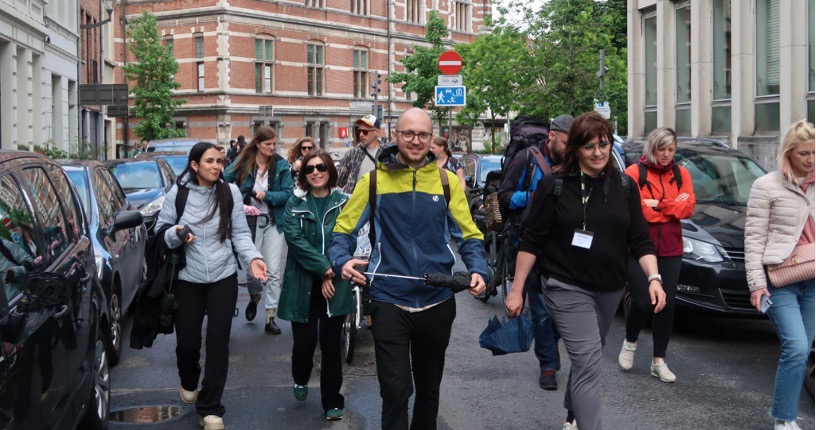
Last but not least, we took a short walk to Jes Youth Centre, where we heard about the inspiring ways in which the young people of the city can be reached, brought together, and supported to overcome difficulties they and their communities face. Here, as with every organisation we visited, we were greeted and shown around by people who were undeniably passionate about their vocation and the work that they do.
Presentations
Cities Meet showcasing the City of Antwerp’s Youth Participation projects and initiatives
Conclusion
In conclusion, throughout our stay in Antwerp, the group was inspired by the unique places that have been transformed into spaces which not only welcome the city’s youth, but were, more often than not, built up and designed by them too.
Insights from “Cities Learn: Citizens’ Assemblies – How and Why?”, hosted by the City of Brussels with guest experts Dimitri Lemaire and Louise Humblet from Particitiz
Webinar 4, 16.04.2024, hosted by the City of Brussels / 125 participants
Dimitri Lemaire and Louise Humblet from Particitiz walked us through how Citizens’ Assemblies are successfully implemented, what basic conditions are required before you begin such a process, and some of the most common challenges faced along the way. Their presentation covered the five steps of implementation:
1. Ensuring there’s genuine political support and will to implement the outcomes;
2. Setting the agenda, with an open question defining the focal topic;
3. Selecting the right experts to present the information in a transparent and accessible way;
4. Designing the recruitment, methods, and follow-up procedures;
5. Thorough evaluation to ensure future processes improve based on participants’ experiences.
They also highlighted the value in implementing Citizens Assemblies – citizens are experts in the field of their own experiences, which are invaluable to capture and explore when it comes to effective policy making.
Insights from “Cities Teach: Climate Assemblies, Green Cities & Biodiversity”, hosted by the City of Brussels with contributions from Valongo and Vienna
Webinar 3, 14.03.2024, hosted by the City of Brussels / 127 participants
Marion Julien, Coordinator for the Climate and Cities in Transition Team for the City of Brussels, highlighted the importance of on-the-ground citizen engagement. She presented the City of Brussels’ use of a cargo bike to reach citizens where they are, thus lowering the threshold for engagement. She also reflected on the challenge of motivating and adequately compensating participants for the long-term engagement required to co-create Climate Plans.
Tiago Koch, from the Environment Division of the Municipality of Valongo, presented the BiodiverCities project which aims to tackle the urban heat-island effect and promote and support biodiversity. Project activities include creating green city walks and BIOteca biodiverse book-exchange stations, implementing invasive-species control measures, and creating pollinator gardens and bug hotels. Citizen participants are involved in an on-going data-collection process to evaluate and improve engagement activities.
Katharina Toth, Energy Planning Consultant for the Vienna Climate Team of the City of Vienna, gave us an overview of the Vienna Climate Team process, focussing on the Citizens’ Jury. The Citizens’ Jury is made up of a group of residents from a district, who are randomly selected while taking into account socio-demographic factors. The Vienna Climate Mosaic game helps jury members understand the complex interactions of various climate actions, with decisions made using a three-tier rating system.
ECN Meeting one:
Cities Meet: Tackling social and climate challenges with Brussels’ solutions
25.-27.03.2024, Brussels
39 participants from 13 countries (35 from 9 eligible for CERV)
Insights from “Cities Meet: Tackling Social & Climate Challenges with Brussels’ Solutions”, hosted by the City of Brussels
ECN Meeting 1, 25-27.03.2024, hosted by the City of Brussels / 39 participants
ECN member cities host regular in-person network meetings (workshops), where representatives come together to share their expertise and best practices in democracy promotion at the municipal level.
The 6th ECN meeting took place in Brussels, as members of the network gathered together to discuss, learn, and exchange with a focus on “tackling social and climate challenges with Brussels’ solutions”.
Over 30 representatives from twelve European cities began to arrive and gathered on the 8th floor of the new Brucity (Brussels City Council) building and admired the view over the rooftops of the city. After kicking off the meeting in Brussels with a warm welcome and comprehensive introduction to the meeting’s focus points, it was off to the rooftop for an obligatory windswept group photograph!
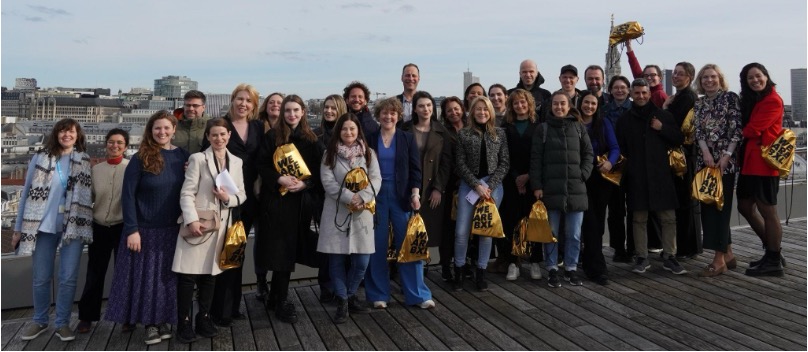
The next day was dedicated to immersive visits around Brussels, showcasing sustainable initiatives that underscore “Climate, Green City and Participation”. The day began with a tour of Tivoli GreenCity, a pioneering eco-district that harmoniously combines innovative living spaces with sustainability. Emphasising green construction and energy efficiency, it fosters active community involvement and encourages citizen participation in its development. This district is also home to Greenbizz, a hub which offers a dynamic environment for sustainable businesses to grow, strengthening the local economy while creating jobs. Here, entrepreneurs can innovate as they strive to contribute to a greener economy and a more sustainable society.
The group were able to gain a deeper understanding of some of the sustainable businesses which began in the Greenbizz hub:
- Snappies introduces a practical solution which drastically cuts disposable nappy waste by providing nurseries with an efficient, cost-effective alternative. This initiative aims to significantly reduce the environmental impact of child care, by providing a nappy-washing service that enables municipal nurseries to use reusable nappies instead of disposable options.
- The FabLab is a hub for digital manufacturing innovation, offering public access to computer-controlled fabrication tools. Here, any citizen can learn digital design and fabrication, as the team empowers individuals to bring their ideas to life, fostering civic creativity.
A short stroll over the road took us to the BE-HERE Business Centre where we were able to learn about the Babbeleir cargo bike, which has revolutionised public interaction in Brussels. This versatile cargo bike enables vibrant policy discussions and community activities to be hosted across the city, fostering face-to-face dialogues with citizens from all walks of life.
Following lunch, the group split into two groups, with one group going on a guided walk of the L28 Park with visits to Permafungi, the Gare Maritime, and a CyCLO bike repair shop.
The other group returned to Brucity for presentations on the GoodMove Pentagone mobility initiative, the city’s heat-network initiative, as well as the Troc&Brol project.
The City Network’s meeting in Brussels was concluded on the following morning with insightful presentations on Brussels’ approach to climate challenges at the Old City Hall. These presentations provided an overview of the Citizens’ Assemblies of both the City and Region of Brussels, followed by a guided tour of the historic Brussels City Hall. As several member cities are also currently planning and conducting citizens’ assemblies, these presentations provided useful and detailed insights into how Brussels overcame some of the challenges associated with citizens’ assemblies. We learnt about how methods of citizen engagement were developed based on thorough evaluation of citizens’ experiences.
Presentations:
Cities Meet: Tackling social and climate challenges with Brussels’ solutions
Conclusion
With European cities being at the forefront of today’s social, climate, and environmental challenges, the ECN’s visit provided our members with insights into Brussels’ innovative and ambitious initiatives which face these challenges. These groundbreaking solutions have been developed by public authorities, entrepreneurs, and civic society. City specialists from across Europe were able to explore how Brussels formulates its public policies through close consultation with citizens and stakeholders across various sectors. In conclusion, Brussels’ stakeholders used real-life examples to illustrate the tools and strategies used to transform the city while engaging both its citizens and other city-users.
Insights from “Cities Learn: Sweating to make Data-Driven Policies a Reality”,
hosted by the City of Barcelona with guest expert Pau Balcells
Webinar 2, 22.02.2024, hosted by the City of Barcelona / 191 participants (for Webinar 1+2 combined)
Pau Palcells, Programme Manager of the Municipal Data Office of the City of Barcelona, presented the challenges and opportunities of using data to drive municipal policies. As technology continues to advance rapidly, politicians struggle to use data to enhance democratic processes. But data can be used as a rich growth medium for policies, as well as to evaluate their efficacy and to focus services based on citizens’ needs. One important factor is to have a robust Data Governance Model in order to safely and transparently manage data while making it both usable and available. It’s also prudent to remember that perfection is the enemy of progress and that an agile approach which delivers short-term results helps to prove the usefulness of data when developing or evaluating policies.
Insights from “Cities Teach: Digital Transformation and Democracy in the City”, hosted by the City of Barcelona with contributions from Bologna
Webinar 1, 20.12.2023, hosted by the City of Barcelona / 191 participants (for Webinar 1+2 combined)
Arnau Monterde, Director of Democratic Innovation Department of Barcelona City Council, presented the Decidm platform, which is a free, open-source platform for citizen participation. This platform was developed by the Democratic Innovation Department of Barcelona City Council and works at the city, technical, and community levels to further the development of democratic technological innovation. Decidim is now a global platform for digital democracy, as it has been implemented in 30 countries by 300 public organisations, engaging 3 million participants. The platform facilitates participation spaces, public debates, and participatory budgets, among other forms of digital democracy.
Giovanni Farneti of Agenda Digitale presented the Municipality of Bologna’s Zerodiciotto App, the Mobility Management System, and the Portici App. The Zerodiciotto App facilitates communication between parents and Municipal Schools, to report absences and receive real-time notifications from the schools. The Mobility Management System allows two-way communication between the Municipality and residents about how mobility is managed within the city, with efficient communication and distribution of questionnaires and surveys, and subsequent collation and dissemination of the collected data. Lastly, the Portici App monitors the city’s Porticos with an interactive dashboard that facilitates residents’ participation.



